Reflective Practices: Meaning, Theories, and Benefits
VerifiedAdded on 2023/06/11
|17
|6256
|119
AI Summary
This report discusses reflective practices, including the meaning of reflective practice, evaluating theories of reflective practice, and analyzing the benefits of reflection in action and reflection on action. It also includes a reflective essay and development plan. The report highlights the importance of reflective practices in personal and professional development.
Contribute Materials
Your contribution can guide someone’s learning journey. Share your
documents today.
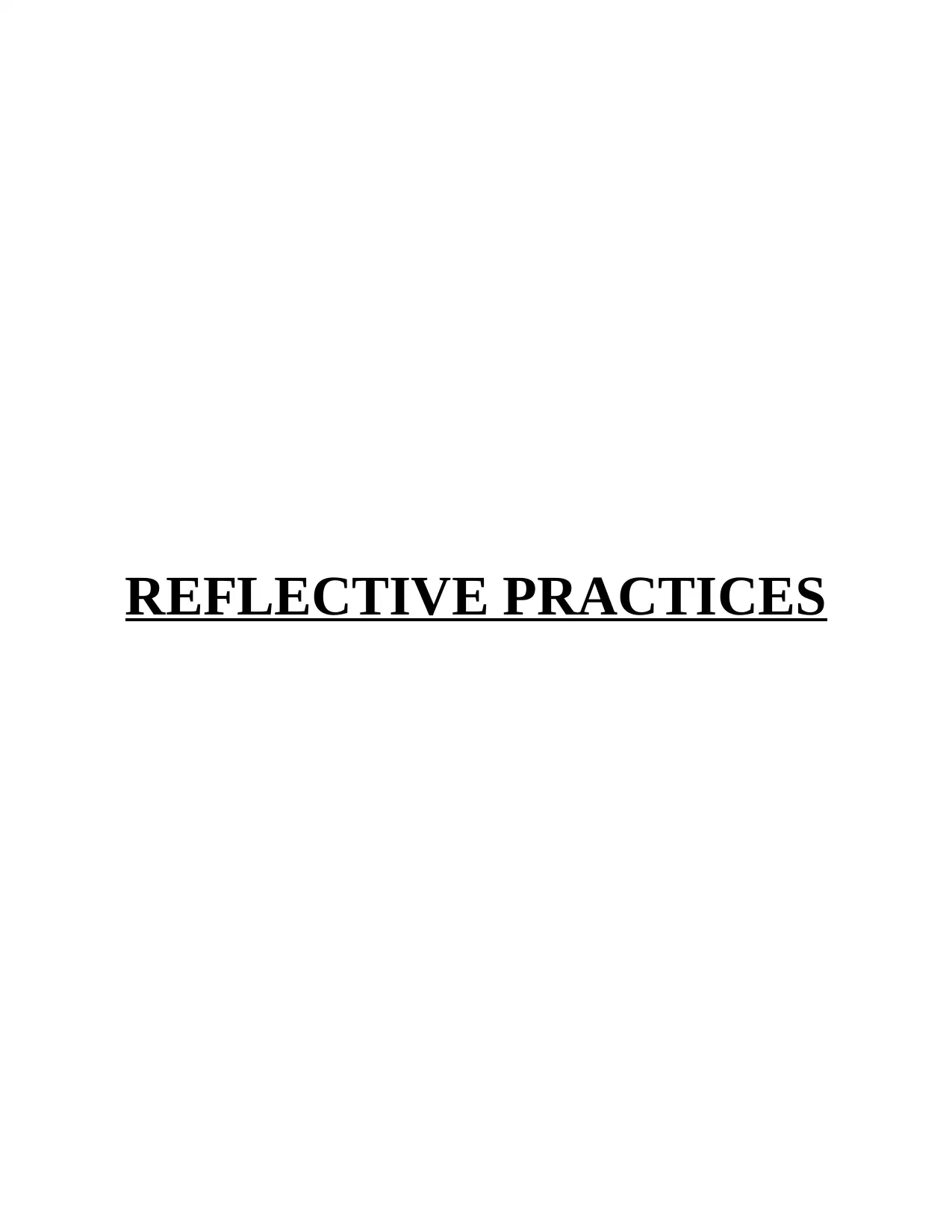
REFLECTIVE PRACTICES
Secure Best Marks with AI Grader
Need help grading? Try our AI Grader for instant feedback on your assignments.
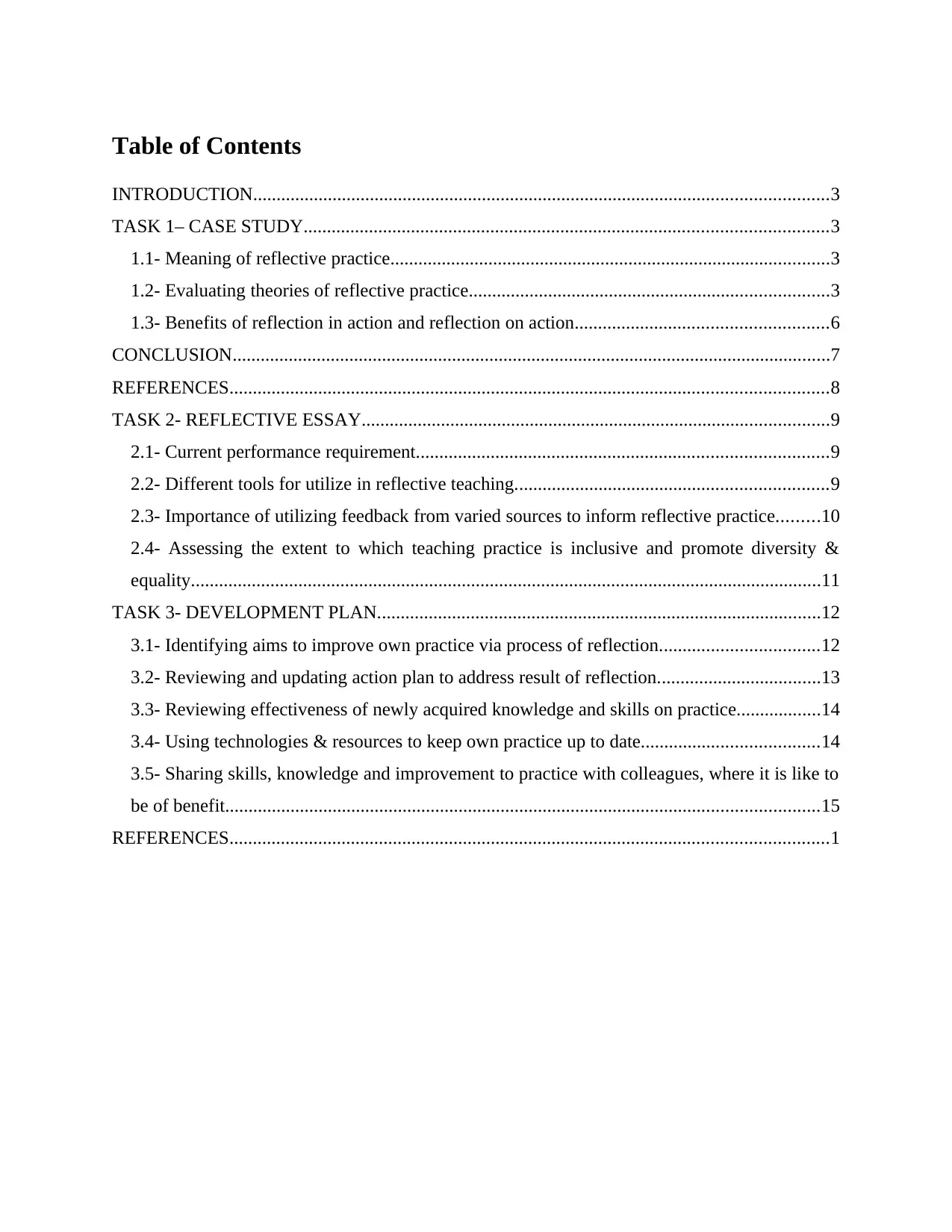
Table of Contents
INTRODUCTION...........................................................................................................................3
TASK 1– CASE STUDY................................................................................................................3
1.1- Meaning of reflective practice..............................................................................................3
1.2- Evaluating theories of reflective practice.............................................................................3
1.3- Benefits of reflection in action and reflection on action......................................................6
CONCLUSION................................................................................................................................7
REFERENCES................................................................................................................................8
TASK 2- REFLECTIVE ESSAY....................................................................................................9
2.1- Current performance requirement........................................................................................9
2.2- Different tools for utilize in reflective teaching...................................................................9
2.3- Importance of utilizing feedback from varied sources to inform reflective practice.........10
2.4- Assessing the extent to which teaching practice is inclusive and promote diversity &
equality.......................................................................................................................................11
TASK 3- DEVELOPMENT PLAN...............................................................................................12
3.1- Identifying aims to improve own practice via process of reflection..................................12
3.2- Reviewing and updating action plan to address result of reflection...................................13
3.3- Reviewing effectiveness of newly acquired knowledge and skills on practice..................14
3.4- Using technologies & resources to keep own practice up to date......................................14
3.5- Sharing skills, knowledge and improvement to practice with colleagues, where it is like to
be of benefit...............................................................................................................................15
REFERENCES................................................................................................................................1
INTRODUCTION...........................................................................................................................3
TASK 1– CASE STUDY................................................................................................................3
1.1- Meaning of reflective practice..............................................................................................3
1.2- Evaluating theories of reflective practice.............................................................................3
1.3- Benefits of reflection in action and reflection on action......................................................6
CONCLUSION................................................................................................................................7
REFERENCES................................................................................................................................8
TASK 2- REFLECTIVE ESSAY....................................................................................................9
2.1- Current performance requirement........................................................................................9
2.2- Different tools for utilize in reflective teaching...................................................................9
2.3- Importance of utilizing feedback from varied sources to inform reflective practice.........10
2.4- Assessing the extent to which teaching practice is inclusive and promote diversity &
equality.......................................................................................................................................11
TASK 3- DEVELOPMENT PLAN...............................................................................................12
3.1- Identifying aims to improve own practice via process of reflection..................................12
3.2- Reviewing and updating action plan to address result of reflection...................................13
3.3- Reviewing effectiveness of newly acquired knowledge and skills on practice..................14
3.4- Using technologies & resources to keep own practice up to date......................................14
3.5- Sharing skills, knowledge and improvement to practice with colleagues, where it is like to
be of benefit...............................................................................................................................15
REFERENCES................................................................................................................................1
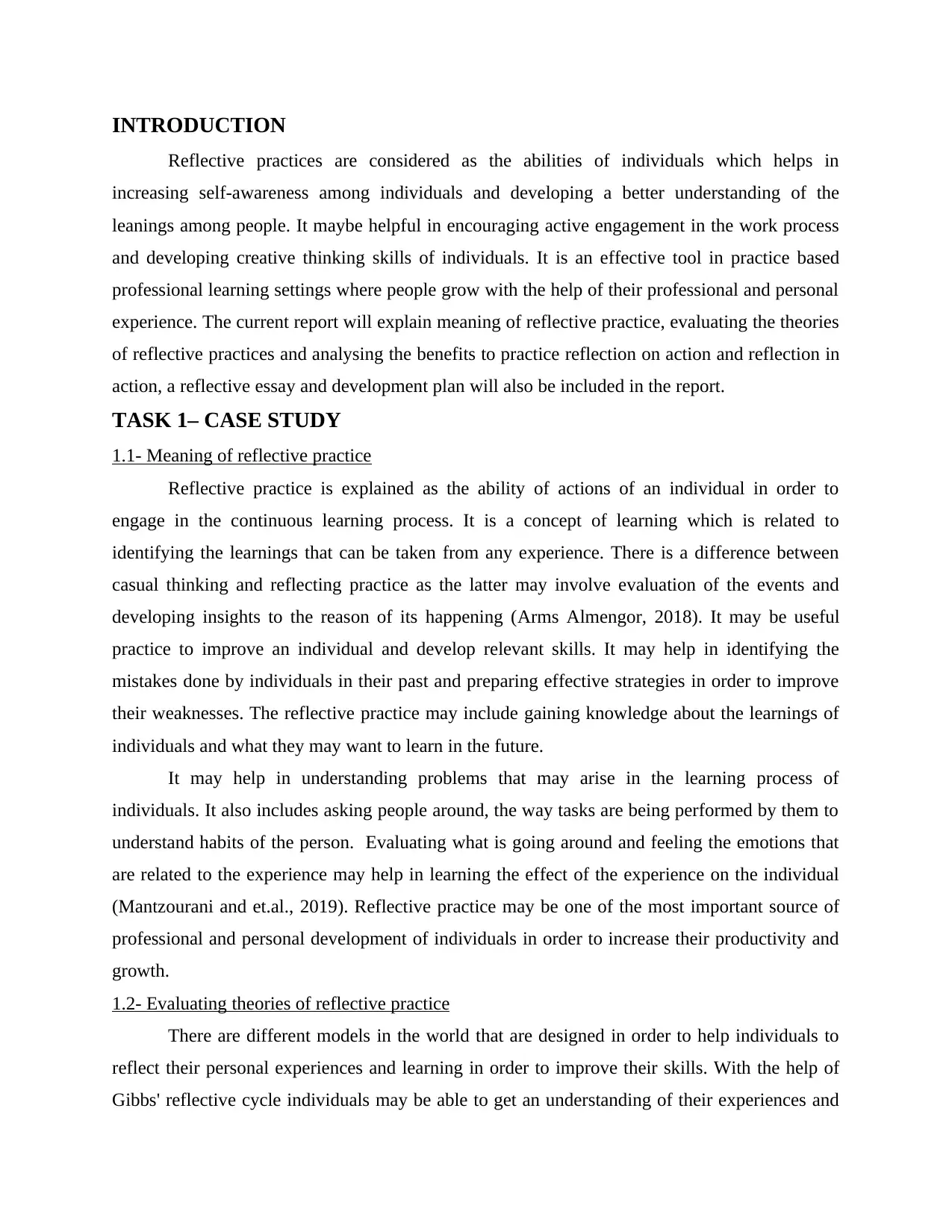
INTRODUCTION
Reflective practices are considered as the abilities of individuals which helps in
increasing self-awareness among individuals and developing a better understanding of the
leanings among people. It maybe helpful in encouraging active engagement in the work process
and developing creative thinking skills of individuals. It is an effective tool in practice based
professional learning settings where people grow with the help of their professional and personal
experience. The current report will explain meaning of reflective practice, evaluating the theories
of reflective practices and analysing the benefits to practice reflection on action and reflection in
action, a reflective essay and development plan will also be included in the report.
TASK 1– CASE STUDY
1.1- Meaning of reflective practice
Reflective practice is explained as the ability of actions of an individual in order to
engage in the continuous learning process. It is a concept of learning which is related to
identifying the learnings that can be taken from any experience. There is a difference between
casual thinking and reflecting practice as the latter may involve evaluation of the events and
developing insights to the reason of its happening (Arms Almengor, 2018). It may be useful
practice to improve an individual and develop relevant skills. It may help in identifying the
mistakes done by individuals in their past and preparing effective strategies in order to improve
their weaknesses. The reflective practice may include gaining knowledge about the learnings of
individuals and what they may want to learn in the future.
It may help in understanding problems that may arise in the learning process of
individuals. It also includes asking people around, the way tasks are being performed by them to
understand habits of the person. Evaluating what is going around and feeling the emotions that
are related to the experience may help in learning the effect of the experience on the individual
(Mantzourani and et.al., 2019). Reflective practice may be one of the most important source of
professional and personal development of individuals in order to increase their productivity and
growth.
1.2- Evaluating theories of reflective practice
There are different models in the world that are designed in order to help individuals to
reflect their personal experiences and learning in order to improve their skills. With the help of
Gibbs' reflective cycle individuals may be able to get an understanding of their experiences and
Reflective practices are considered as the abilities of individuals which helps in
increasing self-awareness among individuals and developing a better understanding of the
leanings among people. It maybe helpful in encouraging active engagement in the work process
and developing creative thinking skills of individuals. It is an effective tool in practice based
professional learning settings where people grow with the help of their professional and personal
experience. The current report will explain meaning of reflective practice, evaluating the theories
of reflective practices and analysing the benefits to practice reflection on action and reflection in
action, a reflective essay and development plan will also be included in the report.
TASK 1– CASE STUDY
1.1- Meaning of reflective practice
Reflective practice is explained as the ability of actions of an individual in order to
engage in the continuous learning process. It is a concept of learning which is related to
identifying the learnings that can be taken from any experience. There is a difference between
casual thinking and reflecting practice as the latter may involve evaluation of the events and
developing insights to the reason of its happening (Arms Almengor, 2018). It may be useful
practice to improve an individual and develop relevant skills. It may help in identifying the
mistakes done by individuals in their past and preparing effective strategies in order to improve
their weaknesses. The reflective practice may include gaining knowledge about the learnings of
individuals and what they may want to learn in the future.
It may help in understanding problems that may arise in the learning process of
individuals. It also includes asking people around, the way tasks are being performed by them to
understand habits of the person. Evaluating what is going around and feeling the emotions that
are related to the experience may help in learning the effect of the experience on the individual
(Mantzourani and et.al., 2019). Reflective practice may be one of the most important source of
professional and personal development of individuals in order to increase their productivity and
growth.
1.2- Evaluating theories of reflective practice
There are different models in the world that are designed in order to help individuals to
reflect their personal experiences and learning in order to improve their skills. With the help of
Gibbs' reflective cycle individuals may be able to get an understanding of their experiences and
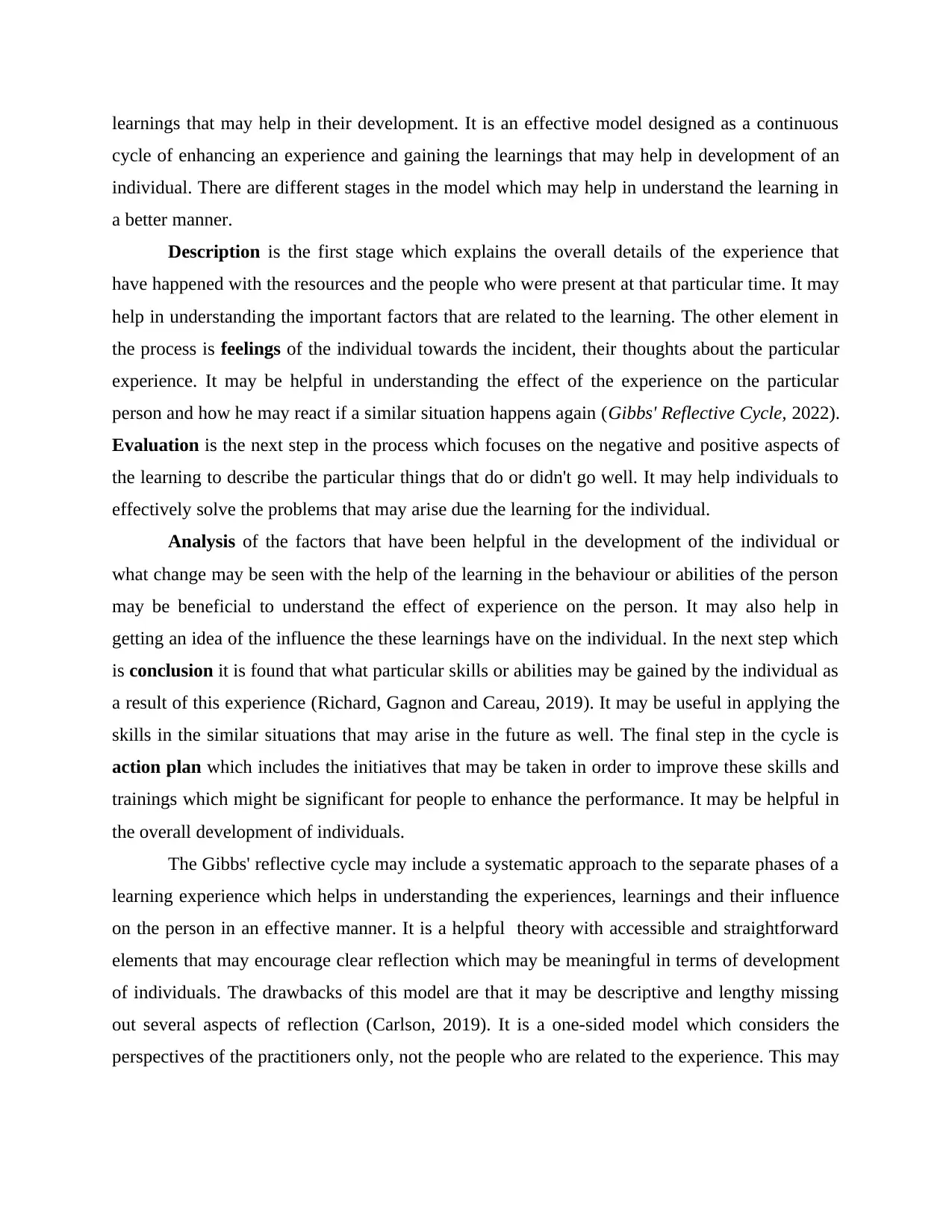
learnings that may help in their development. It is an effective model designed as a continuous
cycle of enhancing an experience and gaining the learnings that may help in development of an
individual. There are different stages in the model which may help in understand the learning in
a better manner.
Description is the first stage which explains the overall details of the experience that
have happened with the resources and the people who were present at that particular time. It may
help in understanding the important factors that are related to the learning. The other element in
the process is feelings of the individual towards the incident, their thoughts about the particular
experience. It may be helpful in understanding the effect of the experience on the particular
person and how he may react if a similar situation happens again (Gibbs' Reflective Cycle, 2022).
Evaluation is the next step in the process which focuses on the negative and positive aspects of
the learning to describe the particular things that do or didn't go well. It may help individuals to
effectively solve the problems that may arise due the learning for the individual.
Analysis of the factors that have been helpful in the development of the individual or
what change may be seen with the help of the learning in the behaviour or abilities of the person
may be beneficial to understand the effect of experience on the person. It may also help in
getting an idea of the influence the these learnings have on the individual. In the next step which
is conclusion it is found that what particular skills or abilities may be gained by the individual as
a result of this experience (Richard, Gagnon and Careau, 2019). It may be useful in applying the
skills in the similar situations that may arise in the future as well. The final step in the cycle is
action plan which includes the initiatives that may be taken in order to improve these skills and
trainings which might be significant for people to enhance the performance. It may be helpful in
the overall development of individuals.
The Gibbs' reflective cycle may include a systematic approach to the separate phases of a
learning experience which helps in understanding the experiences, learnings and their influence
on the person in an effective manner. It is a helpful theory with accessible and straightforward
elements that may encourage clear reflection which may be meaningful in terms of development
of individuals. The drawbacks of this model are that it may be descriptive and lengthy missing
out several aspects of reflection (Carlson, 2019). It is a one-sided model which considers the
perspectives of the practitioners only, not the people who are related to the experience. This may
cycle of enhancing an experience and gaining the learnings that may help in development of an
individual. There are different stages in the model which may help in understand the learning in
a better manner.
Description is the first stage which explains the overall details of the experience that
have happened with the resources and the people who were present at that particular time. It may
help in understanding the important factors that are related to the learning. The other element in
the process is feelings of the individual towards the incident, their thoughts about the particular
experience. It may be helpful in understanding the effect of the experience on the particular
person and how he may react if a similar situation happens again (Gibbs' Reflective Cycle, 2022).
Evaluation is the next step in the process which focuses on the negative and positive aspects of
the learning to describe the particular things that do or didn't go well. It may help individuals to
effectively solve the problems that may arise due the learning for the individual.
Analysis of the factors that have been helpful in the development of the individual or
what change may be seen with the help of the learning in the behaviour or abilities of the person
may be beneficial to understand the effect of experience on the person. It may also help in
getting an idea of the influence the these learnings have on the individual. In the next step which
is conclusion it is found that what particular skills or abilities may be gained by the individual as
a result of this experience (Richard, Gagnon and Careau, 2019). It may be useful in applying the
skills in the similar situations that may arise in the future as well. The final step in the cycle is
action plan which includes the initiatives that may be taken in order to improve these skills and
trainings which might be significant for people to enhance the performance. It may be helpful in
the overall development of individuals.
The Gibbs' reflective cycle may include a systematic approach to the separate phases of a
learning experience which helps in understanding the experiences, learnings and their influence
on the person in an effective manner. It is a helpful theory with accessible and straightforward
elements that may encourage clear reflection which may be meaningful in terms of development
of individuals. The drawbacks of this model are that it may be descriptive and lengthy missing
out several aspects of reflection (Carlson, 2019). It is a one-sided model which considers the
perspectives of the practitioners only, not the people who are related to the experience. This may
Secure Best Marks with AI Grader
Need help grading? Try our AI Grader for instant feedback on your assignments.
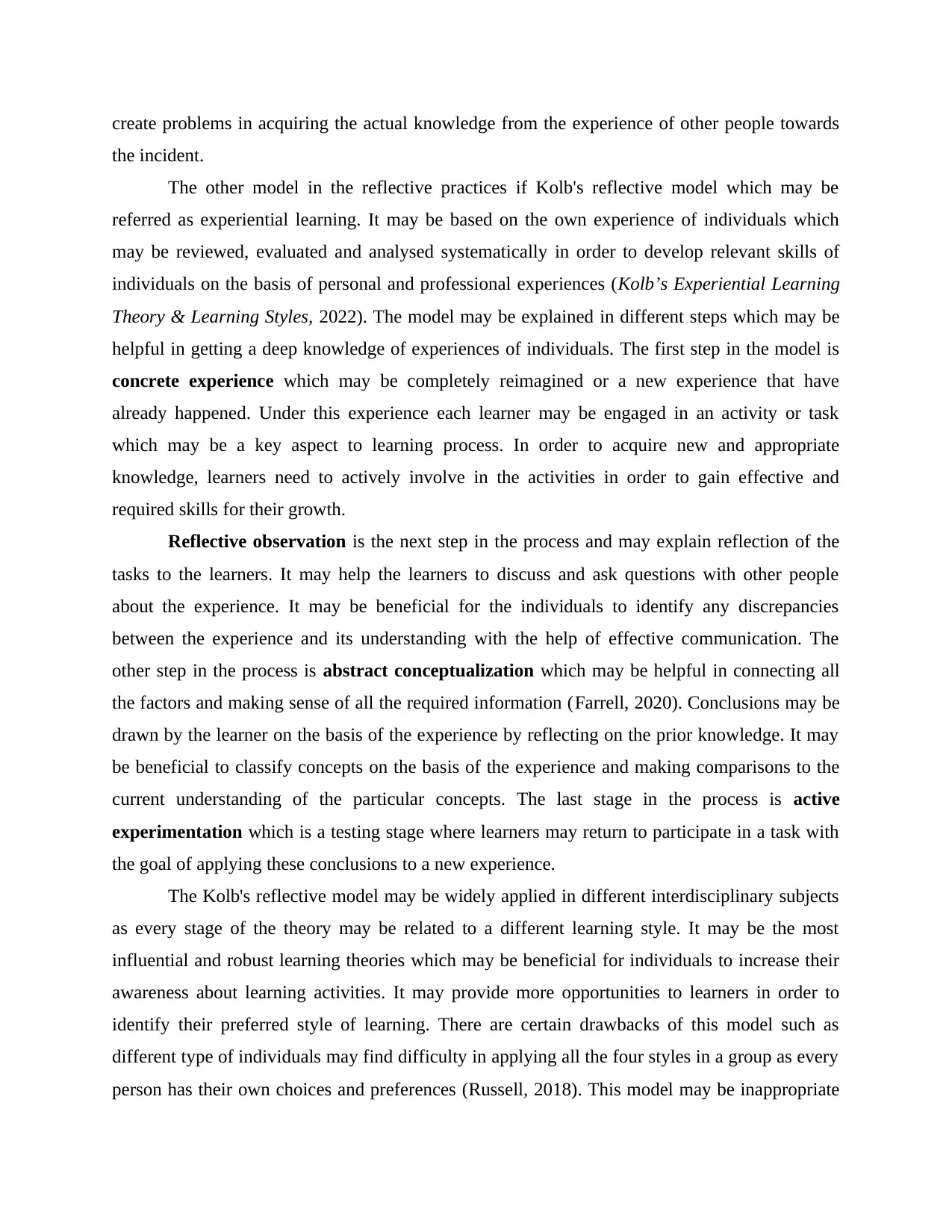
create problems in acquiring the actual knowledge from the experience of other people towards
the incident.
The other model in the reflective practices if Kolb's reflective model which may be
referred as experiential learning. It may be based on the own experience of individuals which
may be reviewed, evaluated and analysed systematically in order to develop relevant skills of
individuals on the basis of personal and professional experiences (Kolb’s Experiential Learning
Theory & Learning Styles, 2022). The model may be explained in different steps which may be
helpful in getting a deep knowledge of experiences of individuals. The first step in the model is
concrete experience which may be completely reimagined or a new experience that have
already happened. Under this experience each learner may be engaged in an activity or task
which may be a key aspect to learning process. In order to acquire new and appropriate
knowledge, learners need to actively involve in the activities in order to gain effective and
required skills for their growth.
Reflective observation is the next step in the process and may explain reflection of the
tasks to the learners. It may help the learners to discuss and ask questions with other people
about the experience. It may be beneficial for the individuals to identify any discrepancies
between the experience and its understanding with the help of effective communication. The
other step in the process is abstract conceptualization which may be helpful in connecting all
the factors and making sense of all the required information (Farrell, 2020). Conclusions may be
drawn by the learner on the basis of the experience by reflecting on the prior knowledge. It may
be beneficial to classify concepts on the basis of the experience and making comparisons to the
current understanding of the particular concepts. The last stage in the process is active
experimentation which is a testing stage where learners may return to participate in a task with
the goal of applying these conclusions to a new experience.
The Kolb's reflective model may be widely applied in different interdisciplinary subjects
as every stage of the theory may be related to a different learning style. It may be the most
influential and robust learning theories which may be beneficial for individuals to increase their
awareness about learning activities. It may provide more opportunities to learners in order to
identify their preferred style of learning. There are certain drawbacks of this model such as
different type of individuals may find difficulty in applying all the four styles in a group as every
person has their own choices and preferences (Russell, 2018). This model may be inappropriate
the incident.
The other model in the reflective practices if Kolb's reflective model which may be
referred as experiential learning. It may be based on the own experience of individuals which
may be reviewed, evaluated and analysed systematically in order to develop relevant skills of
individuals on the basis of personal and professional experiences (Kolb’s Experiential Learning
Theory & Learning Styles, 2022). The model may be explained in different steps which may be
helpful in getting a deep knowledge of experiences of individuals. The first step in the model is
concrete experience which may be completely reimagined or a new experience that have
already happened. Under this experience each learner may be engaged in an activity or task
which may be a key aspect to learning process. In order to acquire new and appropriate
knowledge, learners need to actively involve in the activities in order to gain effective and
required skills for their growth.
Reflective observation is the next step in the process and may explain reflection of the
tasks to the learners. It may help the learners to discuss and ask questions with other people
about the experience. It may be beneficial for the individuals to identify any discrepancies
between the experience and its understanding with the help of effective communication. The
other step in the process is abstract conceptualization which may be helpful in connecting all
the factors and making sense of all the required information (Farrell, 2020). Conclusions may be
drawn by the learner on the basis of the experience by reflecting on the prior knowledge. It may
be beneficial to classify concepts on the basis of the experience and making comparisons to the
current understanding of the particular concepts. The last stage in the process is active
experimentation which is a testing stage where learners may return to participate in a task with
the goal of applying these conclusions to a new experience.
The Kolb's reflective model may be widely applied in different interdisciplinary subjects
as every stage of the theory may be related to a different learning style. It may be the most
influential and robust learning theories which may be beneficial for individuals to increase their
awareness about learning activities. It may provide more opportunities to learners in order to
identify their preferred style of learning. There are certain drawbacks of this model such as
different type of individuals may find difficulty in applying all the four styles in a group as every
person has their own choices and preferences (Russell, 2018). This model may be inappropriate
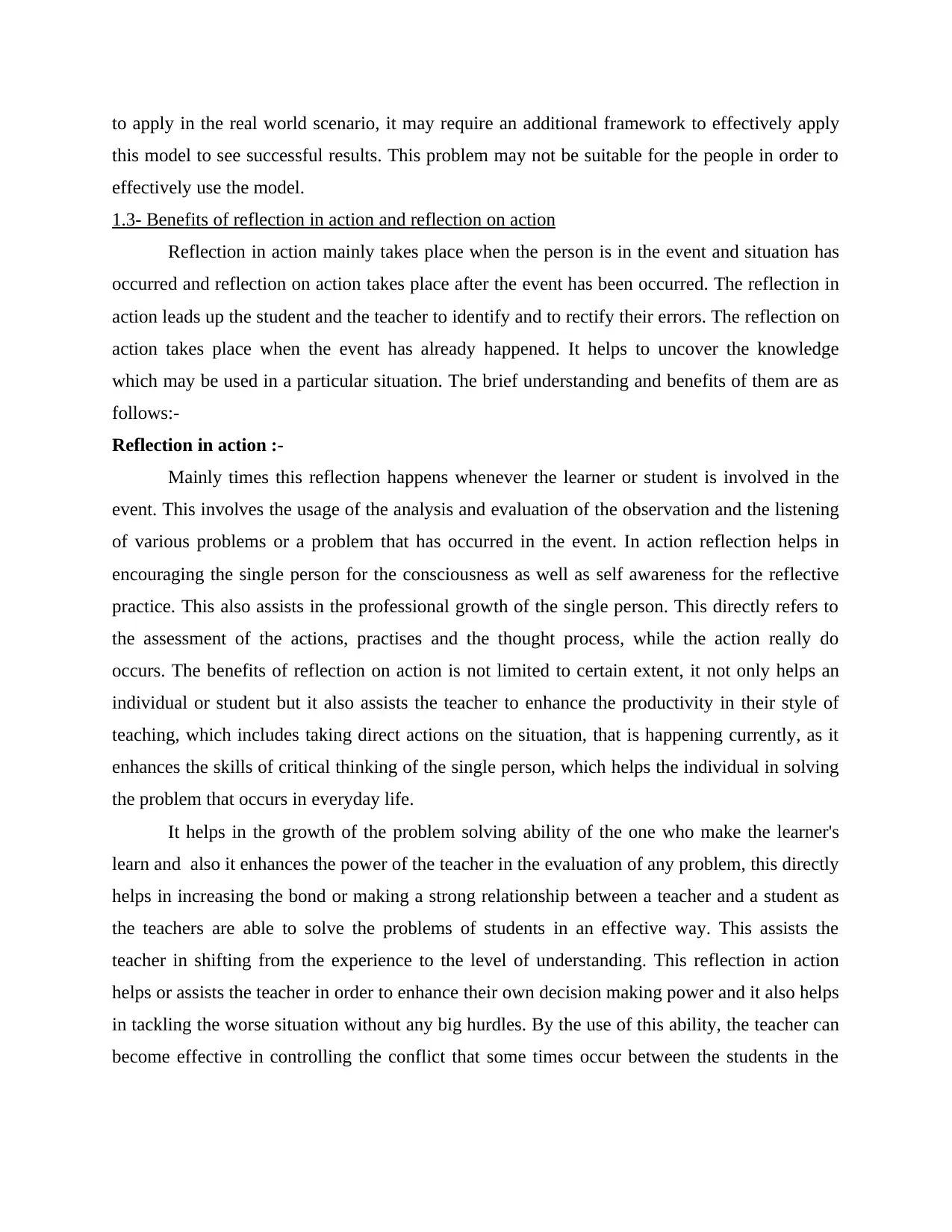
to apply in the real world scenario, it may require an additional framework to effectively apply
this model to see successful results. This problem may not be suitable for the people in order to
effectively use the model.
1.3- Benefits of reflection in action and reflection on action
Reflection in action mainly takes place when the person is in the event and situation has
occurred and reflection on action takes place after the event has been occurred. The reflection in
action leads up the student and the teacher to identify and to rectify their errors. The reflection on
action takes place when the event has already happened. It helps to uncover the knowledge
which may be used in a particular situation. The brief understanding and benefits of them are as
follows:-
Reflection in action :-
Mainly times this reflection happens whenever the learner or student is involved in the
event. This involves the usage of the analysis and evaluation of the observation and the listening
of various problems or a problem that has occurred in the event. In action reflection helps in
encouraging the single person for the consciousness as well as self awareness for the reflective
practice. This also assists in the professional growth of the single person. This directly refers to
the assessment of the actions, practises and the thought process, while the action really do
occurs. The benefits of reflection on action is not limited to certain extent, it not only helps an
individual or student but it also assists the teacher to enhance the productivity in their style of
teaching, which includes taking direct actions on the situation, that is happening currently, as it
enhances the skills of critical thinking of the single person, which helps the individual in solving
the problem that occurs in everyday life.
It helps in the growth of the problem solving ability of the one who make the learner's
learn and also it enhances the power of the teacher in the evaluation of any problem, this directly
helps in increasing the bond or making a strong relationship between a teacher and a student as
the teachers are able to solve the problems of students in an effective way. This assists the
teacher in shifting from the experience to the level of understanding. This reflection in action
helps or assists the teacher in order to enhance their own decision making power and it also helps
in tackling the worse situation without any big hurdles. By the use of this ability, the teacher can
become effective in controlling the conflict that some times occur between the students in the
this model to see successful results. This problem may not be suitable for the people in order to
effectively use the model.
1.3- Benefits of reflection in action and reflection on action
Reflection in action mainly takes place when the person is in the event and situation has
occurred and reflection on action takes place after the event has been occurred. The reflection in
action leads up the student and the teacher to identify and to rectify their errors. The reflection on
action takes place when the event has already happened. It helps to uncover the knowledge
which may be used in a particular situation. The brief understanding and benefits of them are as
follows:-
Reflection in action :-
Mainly times this reflection happens whenever the learner or student is involved in the
event. This involves the usage of the analysis and evaluation of the observation and the listening
of various problems or a problem that has occurred in the event. In action reflection helps in
encouraging the single person for the consciousness as well as self awareness for the reflective
practice. This also assists in the professional growth of the single person. This directly refers to
the assessment of the actions, practises and the thought process, while the action really do
occurs. The benefits of reflection on action is not limited to certain extent, it not only helps an
individual or student but it also assists the teacher to enhance the productivity in their style of
teaching, which includes taking direct actions on the situation, that is happening currently, as it
enhances the skills of critical thinking of the single person, which helps the individual in solving
the problem that occurs in everyday life.
It helps in the growth of the problem solving ability of the one who make the learner's
learn and also it enhances the power of the teacher in the evaluation of any problem, this directly
helps in increasing the bond or making a strong relationship between a teacher and a student as
the teachers are able to solve the problems of students in an effective way. This assists the
teacher in shifting from the experience to the level of understanding. This reflection in action
helps or assists the teacher in order to enhance their own decision making power and it also helps
in tackling the worse situation without any big hurdles. By the use of this ability, the teacher can
become effective in controlling the conflict that some times occur between the students in the
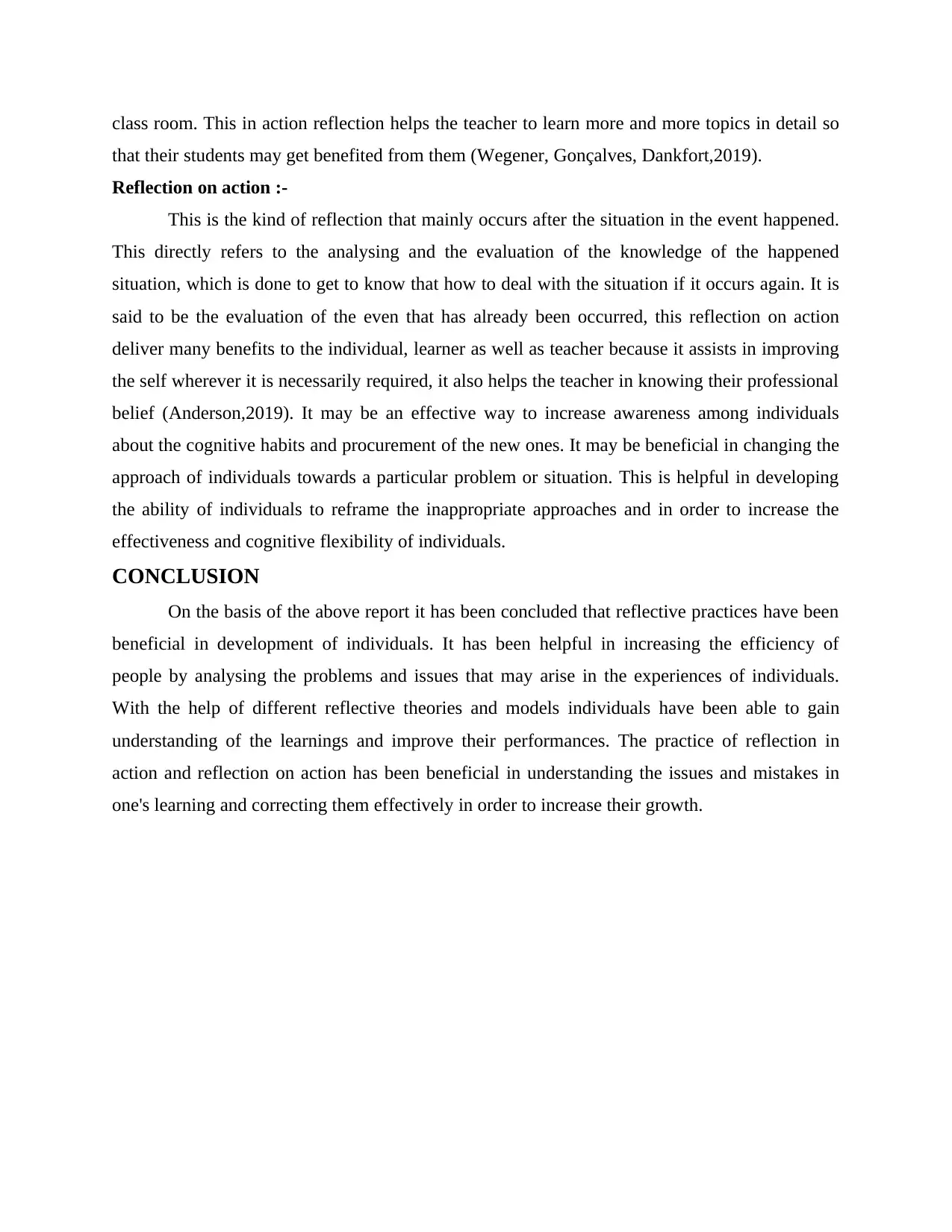
class room. This in action reflection helps the teacher to learn more and more topics in detail so
that their students may get benefited from them (Wegener, Gonçalves, Dankfort,2019).
Reflection on action :-
This is the kind of reflection that mainly occurs after the situation in the event happened.
This directly refers to the analysing and the evaluation of the knowledge of the happened
situation, which is done to get to know that how to deal with the situation if it occurs again. It is
said to be the evaluation of the even that has already been occurred, this reflection on action
deliver many benefits to the individual, learner as well as teacher because it assists in improving
the self wherever it is necessarily required, it also helps the teacher in knowing their professional
belief (Anderson,2019). It may be an effective way to increase awareness among individuals
about the cognitive habits and procurement of the new ones. It may be beneficial in changing the
approach of individuals towards a particular problem or situation. This is helpful in developing
the ability of individuals to reframe the inappropriate approaches and in order to increase the
effectiveness and cognitive flexibility of individuals.
CONCLUSION
On the basis of the above report it has been concluded that reflective practices have been
beneficial in development of individuals. It has been helpful in increasing the efficiency of
people by analysing the problems and issues that may arise in the experiences of individuals.
With the help of different reflective theories and models individuals have been able to gain
understanding of the learnings and improve their performances. The practice of reflection in
action and reflection on action has been beneficial in understanding the issues and mistakes in
one's learning and correcting them effectively in order to increase their growth.
that their students may get benefited from them (Wegener, Gonçalves, Dankfort,2019).
Reflection on action :-
This is the kind of reflection that mainly occurs after the situation in the event happened.
This directly refers to the analysing and the evaluation of the knowledge of the happened
situation, which is done to get to know that how to deal with the situation if it occurs again. It is
said to be the evaluation of the even that has already been occurred, this reflection on action
deliver many benefits to the individual, learner as well as teacher because it assists in improving
the self wherever it is necessarily required, it also helps the teacher in knowing their professional
belief (Anderson,2019). It may be an effective way to increase awareness among individuals
about the cognitive habits and procurement of the new ones. It may be beneficial in changing the
approach of individuals towards a particular problem or situation. This is helpful in developing
the ability of individuals to reframe the inappropriate approaches and in order to increase the
effectiveness and cognitive flexibility of individuals.
CONCLUSION
On the basis of the above report it has been concluded that reflective practices have been
beneficial in development of individuals. It has been helpful in increasing the efficiency of
people by analysing the problems and issues that may arise in the experiences of individuals.
With the help of different reflective theories and models individuals have been able to gain
understanding of the learnings and improve their performances. The practice of reflection in
action and reflection on action has been beneficial in understanding the issues and mistakes in
one's learning and correcting them effectively in order to increase their growth.
Paraphrase This Document
Need a fresh take? Get an instant paraphrase of this document with our AI Paraphraser
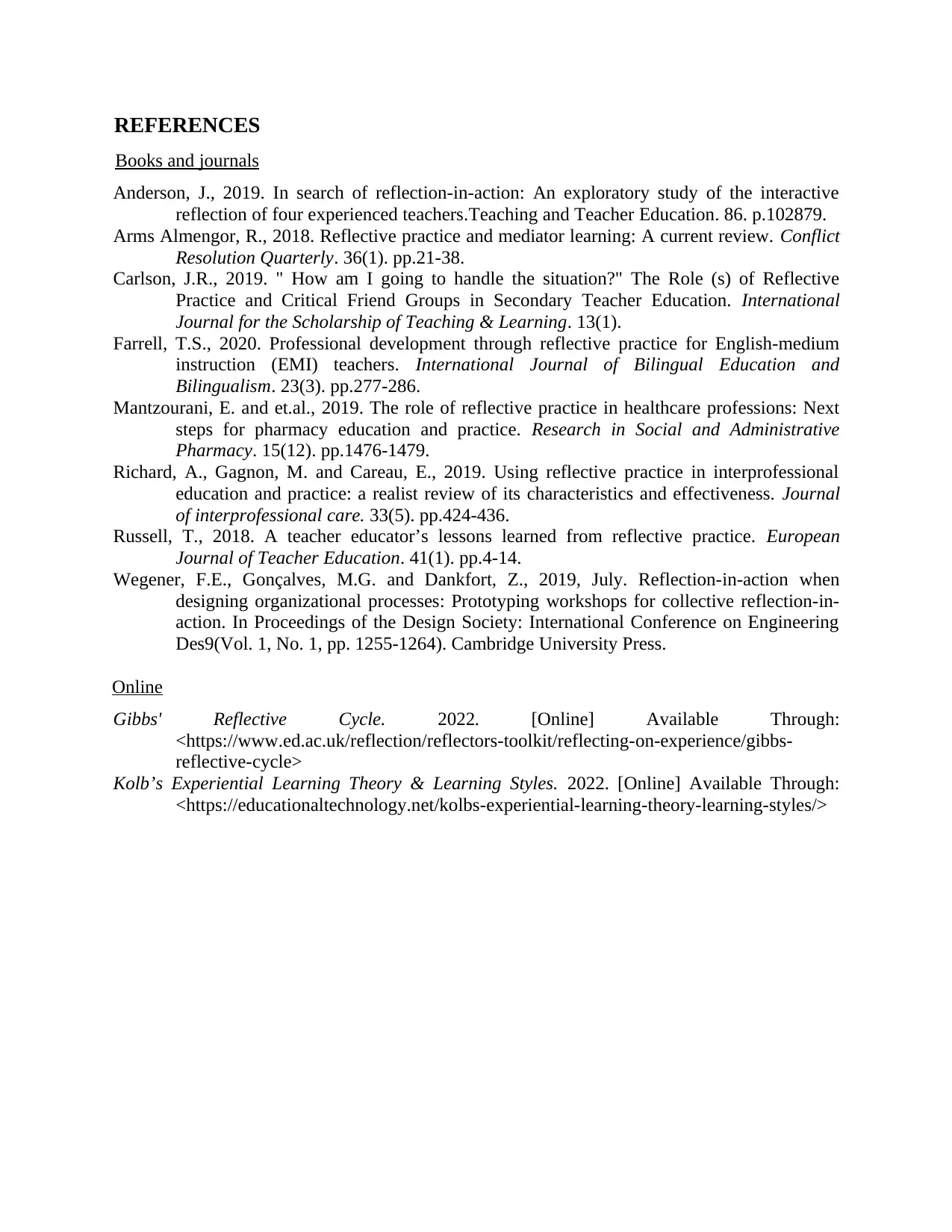
REFERENCES
Books and journals
Anderson, J., 2019. In search of reflection-in-action: An exploratory study of the interactive
reflection of four experienced teachers.Teaching and Teacher Education. 86. p.102879.
Arms Almengor, R., 2018. Reflective practice and mediator learning: A current review. Conflict
Resolution Quarterly. 36(1). pp.21-38.
Carlson, J.R., 2019. " How am I going to handle the situation?" The Role (s) of Reflective
Practice and Critical Friend Groups in Secondary Teacher Education. International
Journal for the Scholarship of Teaching & Learning. 13(1).
Farrell, T.S., 2020. Professional development through reflective practice for English-medium
instruction (EMI) teachers. International Journal of Bilingual Education and
Bilingualism. 23(3). pp.277-286.
Mantzourani, E. and et.al., 2019. The role of reflective practice in healthcare professions: Next
steps for pharmacy education and practice. Research in Social and Administrative
Pharmacy. 15(12). pp.1476-1479.
Richard, A., Gagnon, M. and Careau, E., 2019. Using reflective practice in interprofessional
education and practice: a realist review of its characteristics and effectiveness. Journal
of interprofessional care. 33(5). pp.424-436.
Russell, T., 2018. A teacher educator’s lessons learned from reflective practice. European
Journal of Teacher Education. 41(1). pp.4-14.
Wegener, F.E., Gonçalves, M.G. and Dankfort, Z., 2019, July. Reflection-in-action when
designing organizational processes: Prototyping workshops for collective reflection-in-
action. In Proceedings of the Design Society: International Conference on Engineering
Des9(Vol. 1, No. 1, pp. 1255-1264). Cambridge University Press.
Online
Gibbs' Reflective Cycle. 2022. [Online] Available Through:
<https://www.ed.ac.uk/reflection/reflectors-toolkit/reflecting-on-experience/gibbs-
reflective-cycle>
Kolb’s Experiential Learning Theory & Learning Styles. 2022. [Online] Available Through:
<https://educationaltechnology.net/kolbs-experiential-learning-theory-learning-styles/>
Books and journals
Anderson, J., 2019. In search of reflection-in-action: An exploratory study of the interactive
reflection of four experienced teachers.Teaching and Teacher Education. 86. p.102879.
Arms Almengor, R., 2018. Reflective practice and mediator learning: A current review. Conflict
Resolution Quarterly. 36(1). pp.21-38.
Carlson, J.R., 2019. " How am I going to handle the situation?" The Role (s) of Reflective
Practice and Critical Friend Groups in Secondary Teacher Education. International
Journal for the Scholarship of Teaching & Learning. 13(1).
Farrell, T.S., 2020. Professional development through reflective practice for English-medium
instruction (EMI) teachers. International Journal of Bilingual Education and
Bilingualism. 23(3). pp.277-286.
Mantzourani, E. and et.al., 2019. The role of reflective practice in healthcare professions: Next
steps for pharmacy education and practice. Research in Social and Administrative
Pharmacy. 15(12). pp.1476-1479.
Richard, A., Gagnon, M. and Careau, E., 2019. Using reflective practice in interprofessional
education and practice: a realist review of its characteristics and effectiveness. Journal
of interprofessional care. 33(5). pp.424-436.
Russell, T., 2018. A teacher educator’s lessons learned from reflective practice. European
Journal of Teacher Education. 41(1). pp.4-14.
Wegener, F.E., Gonçalves, M.G. and Dankfort, Z., 2019, July. Reflection-in-action when
designing organizational processes: Prototyping workshops for collective reflection-in-
action. In Proceedings of the Design Society: International Conference on Engineering
Des9(Vol. 1, No. 1, pp. 1255-1264). Cambridge University Press.
Online
Gibbs' Reflective Cycle. 2022. [Online] Available Through:
<https://www.ed.ac.uk/reflection/reflectors-toolkit/reflecting-on-experience/gibbs-
reflective-cycle>
Kolb’s Experiential Learning Theory & Learning Styles. 2022. [Online] Available Through:
<https://educationaltechnology.net/kolbs-experiential-learning-theory-learning-styles/>
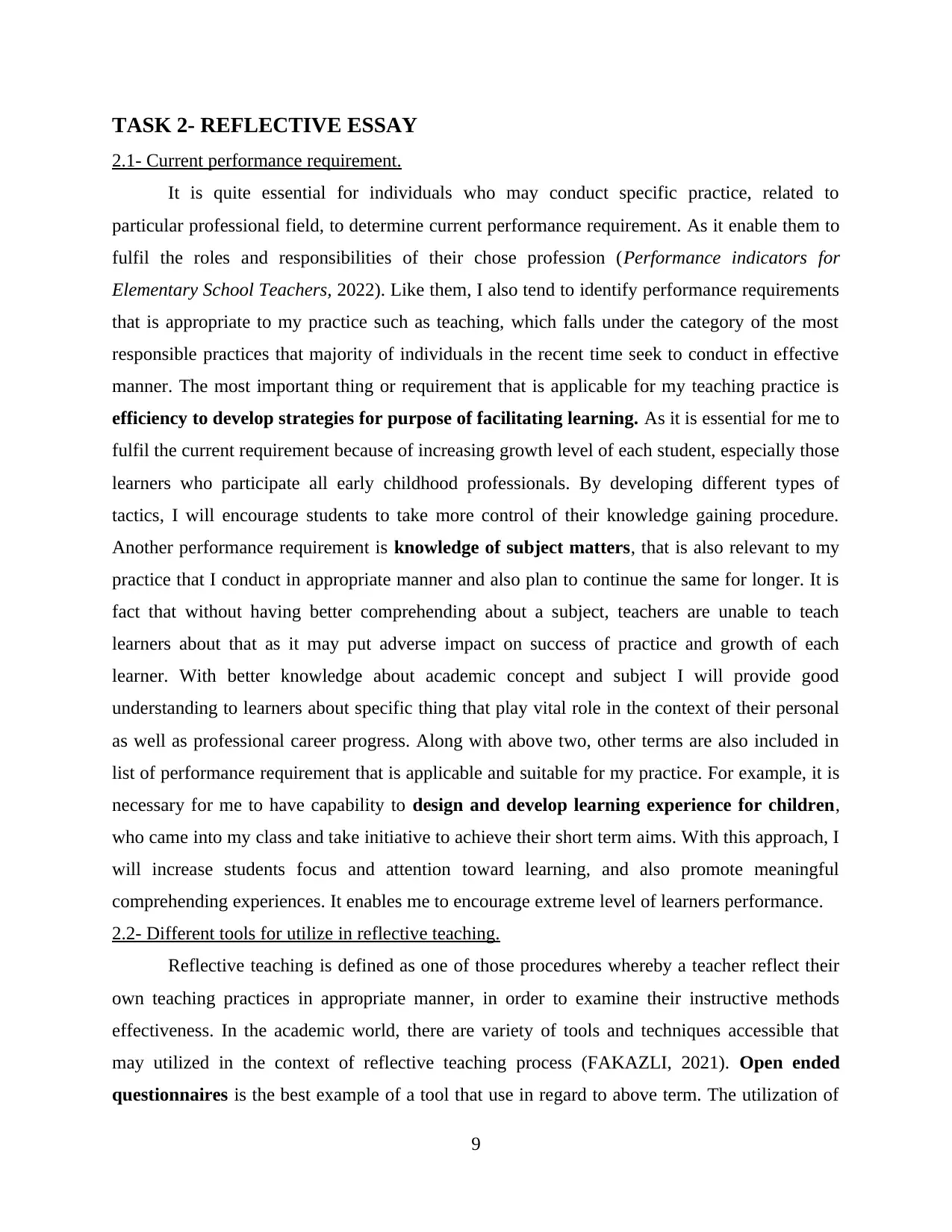
TASK 2- REFLECTIVE ESSAY
2.1- Current performance requirement.
It is quite essential for individuals who may conduct specific practice, related to
particular professional field, to determine current performance requirement. As it enable them to
fulfil the roles and responsibilities of their chose profession (Performance indicators for
Elementary School Teachers, 2022). Like them, I also tend to identify performance requirements
that is appropriate to my practice such as teaching, which falls under the category of the most
responsible practices that majority of individuals in the recent time seek to conduct in effective
manner. The most important thing or requirement that is applicable for my teaching practice is
efficiency to develop strategies for purpose of facilitating learning. As it is essential for me to
fulfil the current requirement because of increasing growth level of each student, especially those
learners who participate all early childhood professionals. By developing different types of
tactics, I will encourage students to take more control of their knowledge gaining procedure.
Another performance requirement is knowledge of subject matters, that is also relevant to my
practice that I conduct in appropriate manner and also plan to continue the same for longer. It is
fact that without having better comprehending about a subject, teachers are unable to teach
learners about that as it may put adverse impact on success of practice and growth of each
learner. With better knowledge about academic concept and subject I will provide good
understanding to learners about specific thing that play vital role in the context of their personal
as well as professional career progress. Along with above two, other terms are also included in
list of performance requirement that is applicable and suitable for my practice. For example, it is
necessary for me to have capability to design and develop learning experience for children,
who came into my class and take initiative to achieve their short term aims. With this approach, I
will increase students focus and attention toward learning, and also promote meaningful
comprehending experiences. It enables me to encourage extreme level of learners performance.
2.2- Different tools for utilize in reflective teaching.
Reflective teaching is defined as one of those procedures whereby a teacher reflect their
own teaching practices in appropriate manner, in order to examine their instructive methods
effectiveness. In the academic world, there are variety of tools and techniques accessible that
may utilized in the context of reflective teaching process (FAKAZLI, 2021). Open ended
questionnaires is the best example of a tool that use in regard to above term. The utilization of
9
2.1- Current performance requirement.
It is quite essential for individuals who may conduct specific practice, related to
particular professional field, to determine current performance requirement. As it enable them to
fulfil the roles and responsibilities of their chose profession (Performance indicators for
Elementary School Teachers, 2022). Like them, I also tend to identify performance requirements
that is appropriate to my practice such as teaching, which falls under the category of the most
responsible practices that majority of individuals in the recent time seek to conduct in effective
manner. The most important thing or requirement that is applicable for my teaching practice is
efficiency to develop strategies for purpose of facilitating learning. As it is essential for me to
fulfil the current requirement because of increasing growth level of each student, especially those
learners who participate all early childhood professionals. By developing different types of
tactics, I will encourage students to take more control of their knowledge gaining procedure.
Another performance requirement is knowledge of subject matters, that is also relevant to my
practice that I conduct in appropriate manner and also plan to continue the same for longer. It is
fact that without having better comprehending about a subject, teachers are unable to teach
learners about that as it may put adverse impact on success of practice and growth of each
learner. With better knowledge about academic concept and subject I will provide good
understanding to learners about specific thing that play vital role in the context of their personal
as well as professional career progress. Along with above two, other terms are also included in
list of performance requirement that is applicable and suitable for my practice. For example, it is
necessary for me to have capability to design and develop learning experience for children,
who came into my class and take initiative to achieve their short term aims. With this approach, I
will increase students focus and attention toward learning, and also promote meaningful
comprehending experiences. It enables me to encourage extreme level of learners performance.
2.2- Different tools for utilize in reflective teaching.
Reflective teaching is defined as one of those procedures whereby a teacher reflect their
own teaching practices in appropriate manner, in order to examine their instructive methods
effectiveness. In the academic world, there are variety of tools and techniques accessible that
may utilized in the context of reflective teaching process (FAKAZLI, 2021). Open ended
questionnaires is the best example of a tool that use in regard to above term. The utilization of
9
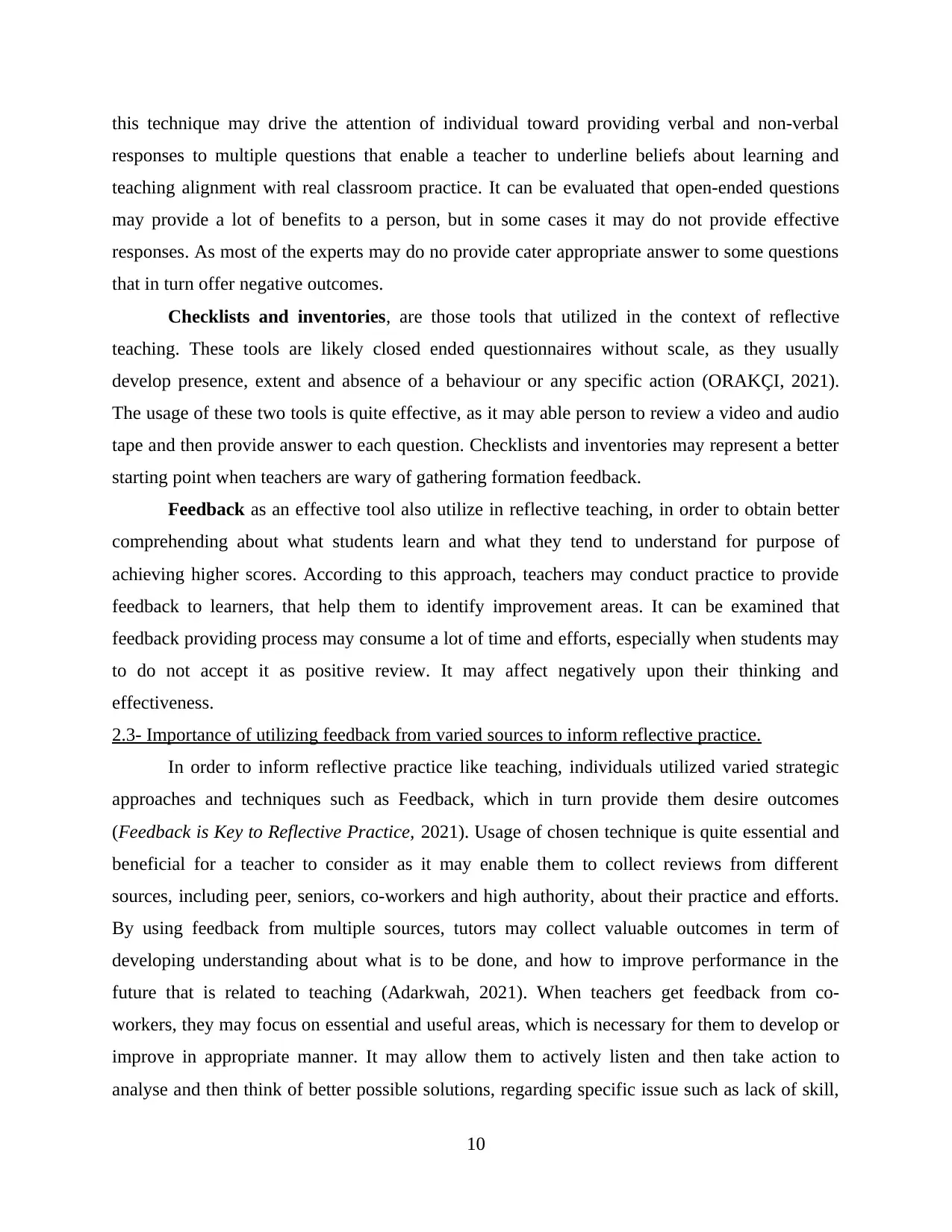
this technique may drive the attention of individual toward providing verbal and non-verbal
responses to multiple questions that enable a teacher to underline beliefs about learning and
teaching alignment with real classroom practice. It can be evaluated that open-ended questions
may provide a lot of benefits to a person, but in some cases it may do not provide effective
responses. As most of the experts may do no provide cater appropriate answer to some questions
that in turn offer negative outcomes.
Checklists and inventories, are those tools that utilized in the context of reflective
teaching. These tools are likely closed ended questionnaires without scale, as they usually
develop presence, extent and absence of a behaviour or any specific action (ORAKÇI, 2021).
The usage of these two tools is quite effective, as it may able person to review a video and audio
tape and then provide answer to each question. Checklists and inventories may represent a better
starting point when teachers are wary of gathering formation feedback.
Feedback as an effective tool also utilize in reflective teaching, in order to obtain better
comprehending about what students learn and what they tend to understand for purpose of
achieving higher scores. According to this approach, teachers may conduct practice to provide
feedback to learners, that help them to identify improvement areas. It can be examined that
feedback providing process may consume a lot of time and efforts, especially when students may
to do not accept it as positive review. It may affect negatively upon their thinking and
effectiveness.
2.3- Importance of utilizing feedback from varied sources to inform reflective practice.
In order to inform reflective practice like teaching, individuals utilized varied strategic
approaches and techniques such as Feedback, which in turn provide them desire outcomes
(Feedback is Key to Reflective Practice, 2021). Usage of chosen technique is quite essential and
beneficial for a teacher to consider as it may enable them to collect reviews from different
sources, including peer, seniors, co-workers and high authority, about their practice and efforts.
By using feedback from multiple sources, tutors may collect valuable outcomes in term of
developing understanding about what is to be done, and how to improve performance in the
future that is related to teaching (Adarkwah, 2021). When teachers get feedback from co-
workers, they may focus on essential and useful areas, which is necessary for them to develop or
improve in appropriate manner. It may allow them to actively listen and then take action to
analyse and then think of better possible solutions, regarding specific issue such as lack of skill,
10
responses to multiple questions that enable a teacher to underline beliefs about learning and
teaching alignment with real classroom practice. It can be evaluated that open-ended questions
may provide a lot of benefits to a person, but in some cases it may do not provide effective
responses. As most of the experts may do no provide cater appropriate answer to some questions
that in turn offer negative outcomes.
Checklists and inventories, are those tools that utilized in the context of reflective
teaching. These tools are likely closed ended questionnaires without scale, as they usually
develop presence, extent and absence of a behaviour or any specific action (ORAKÇI, 2021).
The usage of these two tools is quite effective, as it may able person to review a video and audio
tape and then provide answer to each question. Checklists and inventories may represent a better
starting point when teachers are wary of gathering formation feedback.
Feedback as an effective tool also utilize in reflective teaching, in order to obtain better
comprehending about what students learn and what they tend to understand for purpose of
achieving higher scores. According to this approach, teachers may conduct practice to provide
feedback to learners, that help them to identify improvement areas. It can be examined that
feedback providing process may consume a lot of time and efforts, especially when students may
to do not accept it as positive review. It may affect negatively upon their thinking and
effectiveness.
2.3- Importance of utilizing feedback from varied sources to inform reflective practice.
In order to inform reflective practice like teaching, individuals utilized varied strategic
approaches and techniques such as Feedback, which in turn provide them desire outcomes
(Feedback is Key to Reflective Practice, 2021). Usage of chosen technique is quite essential and
beneficial for a teacher to consider as it may enable them to collect reviews from different
sources, including peer, seniors, co-workers and high authority, about their practice and efforts.
By using feedback from multiple sources, tutors may collect valuable outcomes in term of
developing understanding about what is to be done, and how to improve performance in the
future that is related to teaching (Adarkwah, 2021). When teachers get feedback from co-
workers, they may focus on essential and useful areas, which is necessary for them to develop or
improve in appropriate manner. It may allow them to actively listen and then take action to
analyse and then think of better possible solutions, regarding specific issue such as lack of skill,
10
Secure Best Marks with AI Grader
Need help grading? Try our AI Grader for instant feedback on your assignments.
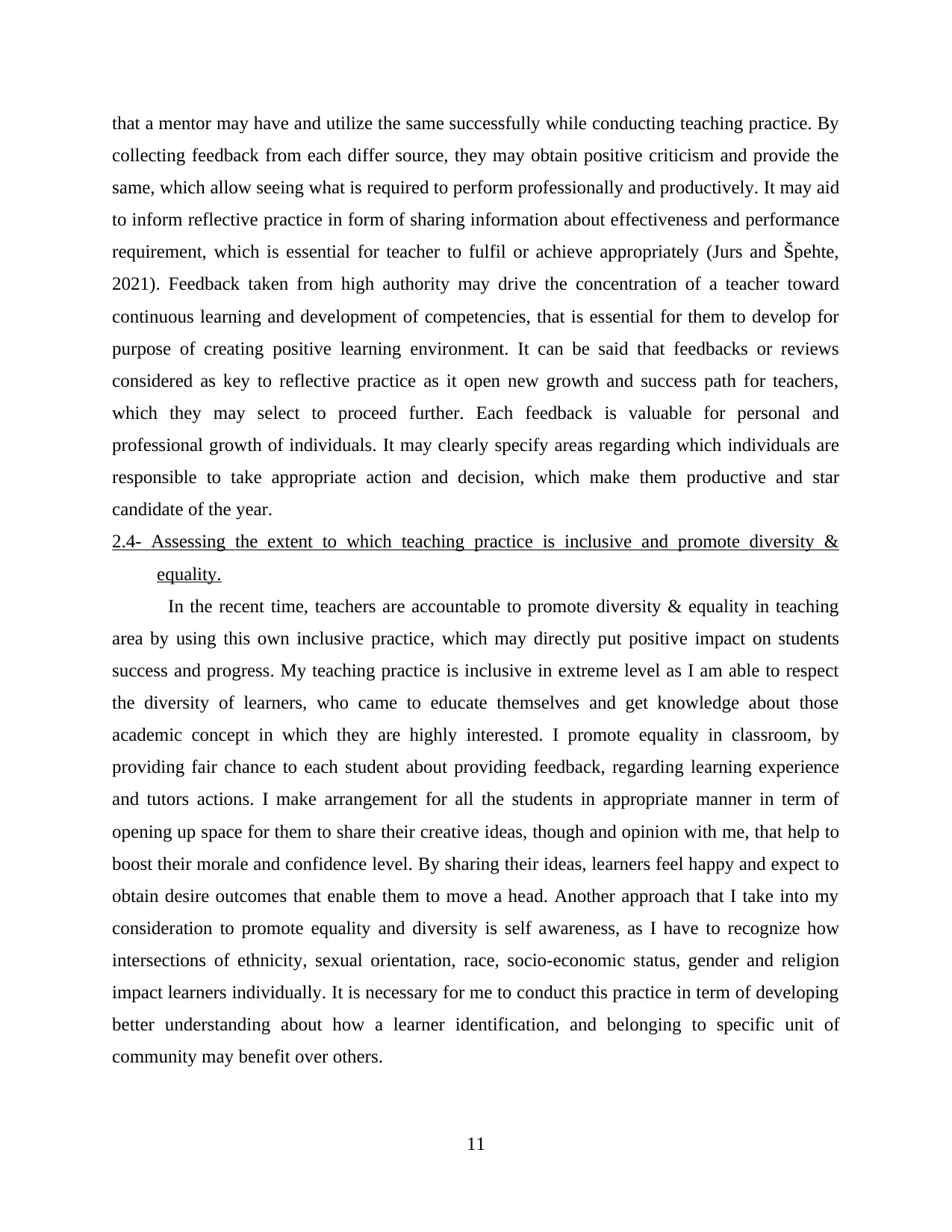
that a mentor may have and utilize the same successfully while conducting teaching practice. By
collecting feedback from each differ source, they may obtain positive criticism and provide the
same, which allow seeing what is required to perform professionally and productively. It may aid
to inform reflective practice in form of sharing information about effectiveness and performance
requirement, which is essential for teacher to fulfil or achieve appropriately (Jurs and Špehte,
2021). Feedback taken from high authority may drive the concentration of a teacher toward
continuous learning and development of competencies, that is essential for them to develop for
purpose of creating positive learning environment. It can be said that feedbacks or reviews
considered as key to reflective practice as it open new growth and success path for teachers,
which they may select to proceed further. Each feedback is valuable for personal and
professional growth of individuals. It may clearly specify areas regarding which individuals are
responsible to take appropriate action and decision, which make them productive and star
candidate of the year.
2.4- Assessing the extent to which teaching practice is inclusive and promote diversity &
equality.
In the recent time, teachers are accountable to promote diversity & equality in teaching
area by using this own inclusive practice, which may directly put positive impact on students
success and progress. My teaching practice is inclusive in extreme level as I am able to respect
the diversity of learners, who came to educate themselves and get knowledge about those
academic concept in which they are highly interested. I promote equality in classroom, by
providing fair chance to each student about providing feedback, regarding learning experience
and tutors actions. I make arrangement for all the students in appropriate manner in term of
opening up space for them to share their creative ideas, though and opinion with me, that help to
boost their morale and confidence level. By sharing their ideas, learners feel happy and expect to
obtain desire outcomes that enable them to move a head. Another approach that I take into my
consideration to promote equality and diversity is self awareness, as I have to recognize how
intersections of ethnicity, sexual orientation, race, socio-economic status, gender and religion
impact learners individually. It is necessary for me to conduct this practice in term of developing
better understanding about how a learner identification, and belonging to specific unit of
community may benefit over others.
11
collecting feedback from each differ source, they may obtain positive criticism and provide the
same, which allow seeing what is required to perform professionally and productively. It may aid
to inform reflective practice in form of sharing information about effectiveness and performance
requirement, which is essential for teacher to fulfil or achieve appropriately (Jurs and Špehte,
2021). Feedback taken from high authority may drive the concentration of a teacher toward
continuous learning and development of competencies, that is essential for them to develop for
purpose of creating positive learning environment. It can be said that feedbacks or reviews
considered as key to reflective practice as it open new growth and success path for teachers,
which they may select to proceed further. Each feedback is valuable for personal and
professional growth of individuals. It may clearly specify areas regarding which individuals are
responsible to take appropriate action and decision, which make them productive and star
candidate of the year.
2.4- Assessing the extent to which teaching practice is inclusive and promote diversity &
equality.
In the recent time, teachers are accountable to promote diversity & equality in teaching
area by using this own inclusive practice, which may directly put positive impact on students
success and progress. My teaching practice is inclusive in extreme level as I am able to respect
the diversity of learners, who came to educate themselves and get knowledge about those
academic concept in which they are highly interested. I promote equality in classroom, by
providing fair chance to each student about providing feedback, regarding learning experience
and tutors actions. I make arrangement for all the students in appropriate manner in term of
opening up space for them to share their creative ideas, though and opinion with me, that help to
boost their morale and confidence level. By sharing their ideas, learners feel happy and expect to
obtain desire outcomes that enable them to move a head. Another approach that I take into my
consideration to promote equality and diversity is self awareness, as I have to recognize how
intersections of ethnicity, sexual orientation, race, socio-economic status, gender and religion
impact learners individually. It is necessary for me to conduct this practice in term of developing
better understanding about how a learner identification, and belonging to specific unit of
community may benefit over others.
11
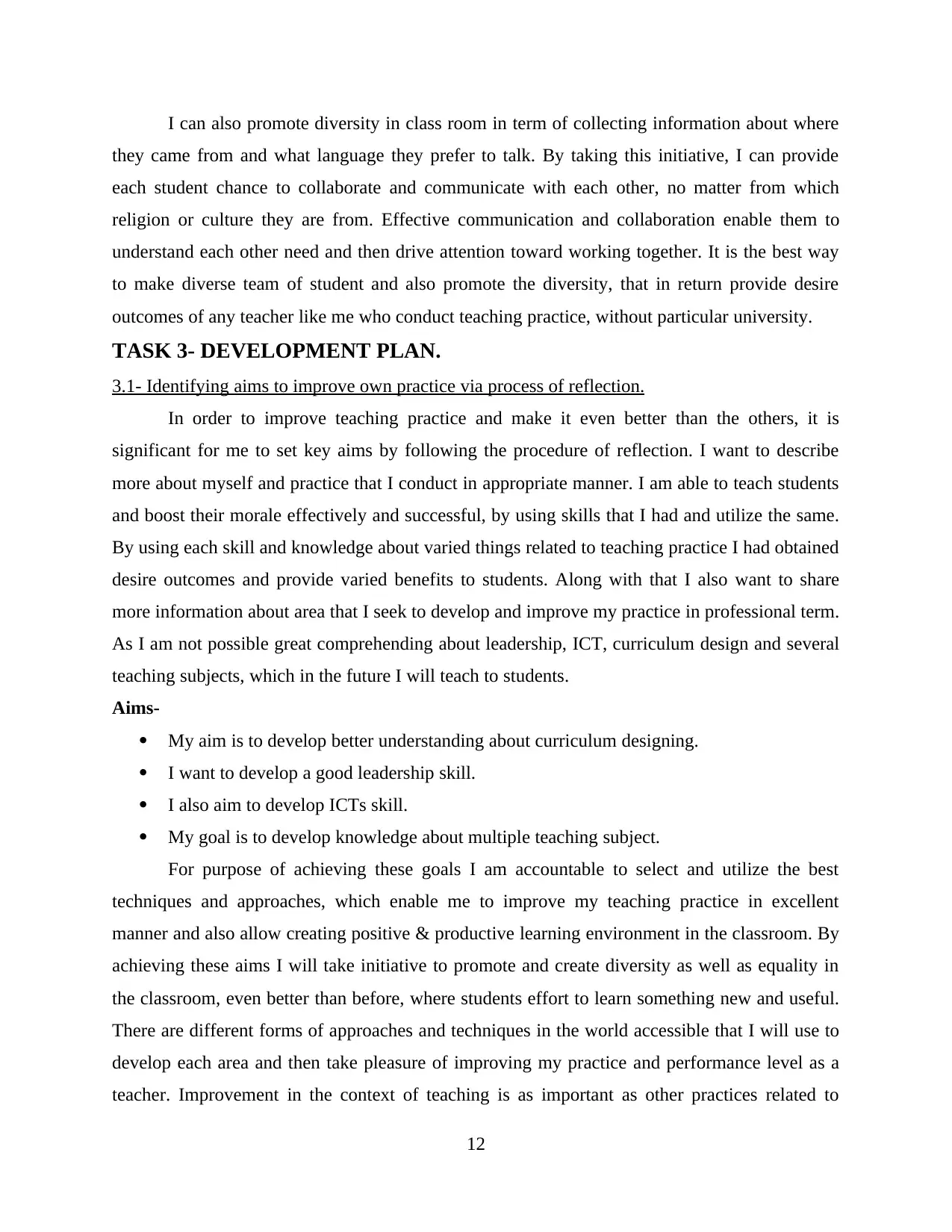
I can also promote diversity in class room in term of collecting information about where
they came from and what language they prefer to talk. By taking this initiative, I can provide
each student chance to collaborate and communicate with each other, no matter from which
religion or culture they are from. Effective communication and collaboration enable them to
understand each other need and then drive attention toward working together. It is the best way
to make diverse team of student and also promote the diversity, that in return provide desire
outcomes of any teacher like me who conduct teaching practice, without particular university.
TASK 3- DEVELOPMENT PLAN.
3.1- Identifying aims to improve own practice via process of reflection.
In order to improve teaching practice and make it even better than the others, it is
significant for me to set key aims by following the procedure of reflection. I want to describe
more about myself and practice that I conduct in appropriate manner. I am able to teach students
and boost their morale effectively and successful, by using skills that I had and utilize the same.
By using each skill and knowledge about varied things related to teaching practice I had obtained
desire outcomes and provide varied benefits to students. Along with that I also want to share
more information about area that I seek to develop and improve my practice in professional term.
As I am not possible great comprehending about leadership, ICT, curriculum design and several
teaching subjects, which in the future I will teach to students.
Aims-
My aim is to develop better understanding about curriculum designing.
I want to develop a good leadership skill.
I also aim to develop ICTs skill.
My goal is to develop knowledge about multiple teaching subject.
For purpose of achieving these goals I am accountable to select and utilize the best
techniques and approaches, which enable me to improve my teaching practice in excellent
manner and also allow creating positive & productive learning environment in the classroom. By
achieving these aims I will take initiative to promote and create diversity as well as equality in
the classroom, even better than before, where students effort to learn something new and useful.
There are different forms of approaches and techniques in the world accessible that I will use to
develop each area and then take pleasure of improving my practice and performance level as a
teacher. Improvement in the context of teaching is as important as other practices related to
12
they came from and what language they prefer to talk. By taking this initiative, I can provide
each student chance to collaborate and communicate with each other, no matter from which
religion or culture they are from. Effective communication and collaboration enable them to
understand each other need and then drive attention toward working together. It is the best way
to make diverse team of student and also promote the diversity, that in return provide desire
outcomes of any teacher like me who conduct teaching practice, without particular university.
TASK 3- DEVELOPMENT PLAN.
3.1- Identifying aims to improve own practice via process of reflection.
In order to improve teaching practice and make it even better than the others, it is
significant for me to set key aims by following the procedure of reflection. I want to describe
more about myself and practice that I conduct in appropriate manner. I am able to teach students
and boost their morale effectively and successful, by using skills that I had and utilize the same.
By using each skill and knowledge about varied things related to teaching practice I had obtained
desire outcomes and provide varied benefits to students. Along with that I also want to share
more information about area that I seek to develop and improve my practice in professional term.
As I am not possible great comprehending about leadership, ICT, curriculum design and several
teaching subjects, which in the future I will teach to students.
Aims-
My aim is to develop better understanding about curriculum designing.
I want to develop a good leadership skill.
I also aim to develop ICTs skill.
My goal is to develop knowledge about multiple teaching subject.
For purpose of achieving these goals I am accountable to select and utilize the best
techniques and approaches, which enable me to improve my teaching practice in excellent
manner and also allow creating positive & productive learning environment in the classroom. By
achieving these aims I will take initiative to promote and create diversity as well as equality in
the classroom, even better than before, where students effort to learn something new and useful.
There are different forms of approaches and techniques in the world accessible that I will use to
develop each area and then take pleasure of improving my practice and performance level as a
teacher. Improvement in the context of teaching is as important as other practices related to
12
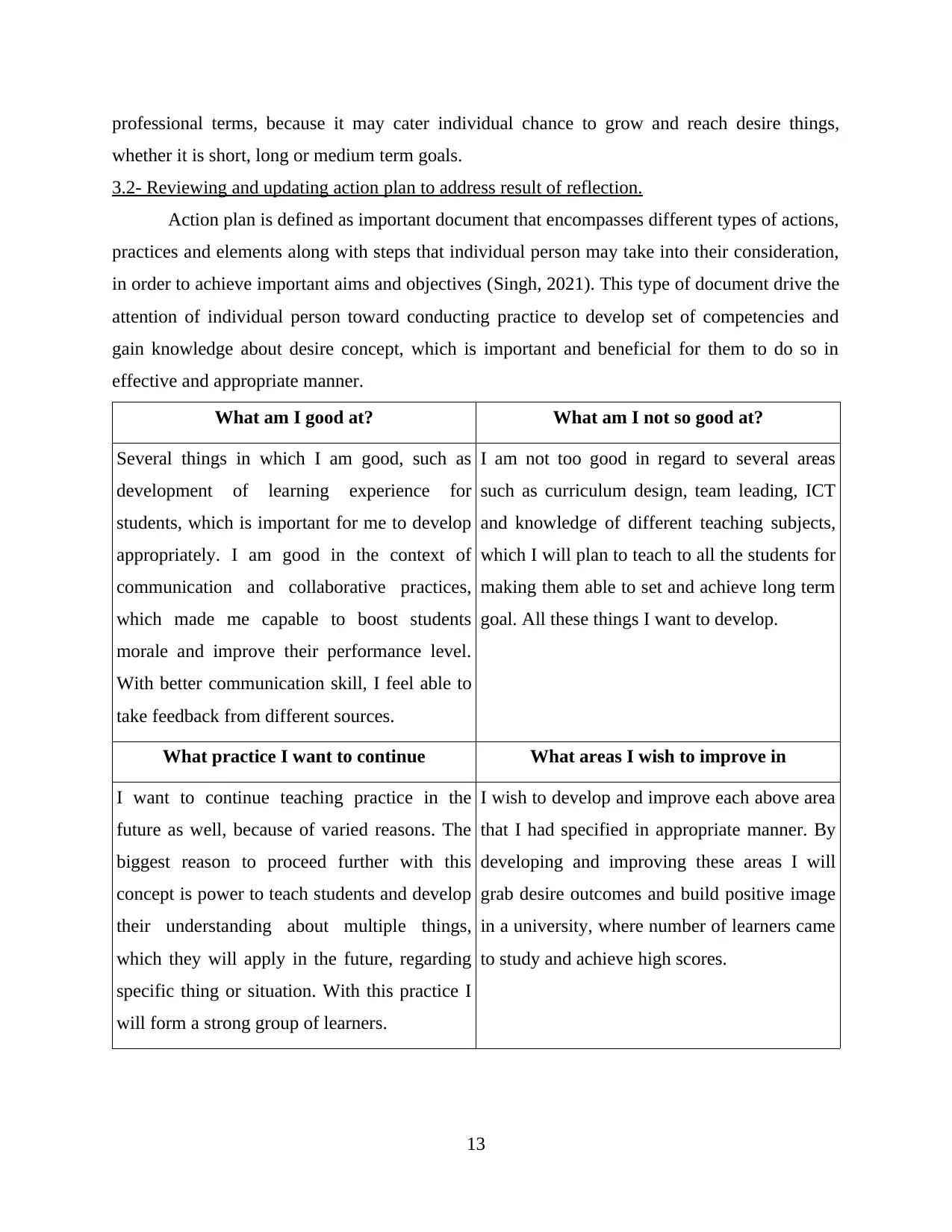
professional terms, because it may cater individual chance to grow and reach desire things,
whether it is short, long or medium term goals.
3.2- Reviewing and updating action plan to address result of reflection.
Action plan is defined as important document that encompasses different types of actions,
practices and elements along with steps that individual person may take into their consideration,
in order to achieve important aims and objectives (Singh, 2021). This type of document drive the
attention of individual person toward conducting practice to develop set of competencies and
gain knowledge about desire concept, which is important and beneficial for them to do so in
effective and appropriate manner.
What am I good at? What am I not so good at?
Several things in which I am good, such as
development of learning experience for
students, which is important for me to develop
appropriately. I am good in the context of
communication and collaborative practices,
which made me capable to boost students
morale and improve their performance level.
With better communication skill, I feel able to
take feedback from different sources.
I am not too good in regard to several areas
such as curriculum design, team leading, ICT
and knowledge of different teaching subjects,
which I will plan to teach to all the students for
making them able to set and achieve long term
goal. All these things I want to develop.
What practice I want to continue What areas I wish to improve in
I want to continue teaching practice in the
future as well, because of varied reasons. The
biggest reason to proceed further with this
concept is power to teach students and develop
their understanding about multiple things,
which they will apply in the future, regarding
specific thing or situation. With this practice I
will form a strong group of learners.
I wish to develop and improve each above area
that I had specified in appropriate manner. By
developing and improving these areas I will
grab desire outcomes and build positive image
in a university, where number of learners came
to study and achieve high scores.
13
whether it is short, long or medium term goals.
3.2- Reviewing and updating action plan to address result of reflection.
Action plan is defined as important document that encompasses different types of actions,
practices and elements along with steps that individual person may take into their consideration,
in order to achieve important aims and objectives (Singh, 2021). This type of document drive the
attention of individual person toward conducting practice to develop set of competencies and
gain knowledge about desire concept, which is important and beneficial for them to do so in
effective and appropriate manner.
What am I good at? What am I not so good at?
Several things in which I am good, such as
development of learning experience for
students, which is important for me to develop
appropriately. I am good in the context of
communication and collaborative practices,
which made me capable to boost students
morale and improve their performance level.
With better communication skill, I feel able to
take feedback from different sources.
I am not too good in regard to several areas
such as curriculum design, team leading, ICT
and knowledge of different teaching subjects,
which I will plan to teach to all the students for
making them able to set and achieve long term
goal. All these things I want to develop.
What practice I want to continue What areas I wish to improve in
I want to continue teaching practice in the
future as well, because of varied reasons. The
biggest reason to proceed further with this
concept is power to teach students and develop
their understanding about multiple things,
which they will apply in the future, regarding
specific thing or situation. With this practice I
will form a strong group of learners.
I wish to develop and improve each above area
that I had specified in appropriate manner. By
developing and improving these areas I will
grab desire outcomes and build positive image
in a university, where number of learners came
to study and achieve high scores.
13
Paraphrase This Document
Need a fresh take? Get an instant paraphrase of this document with our AI Paraphraser
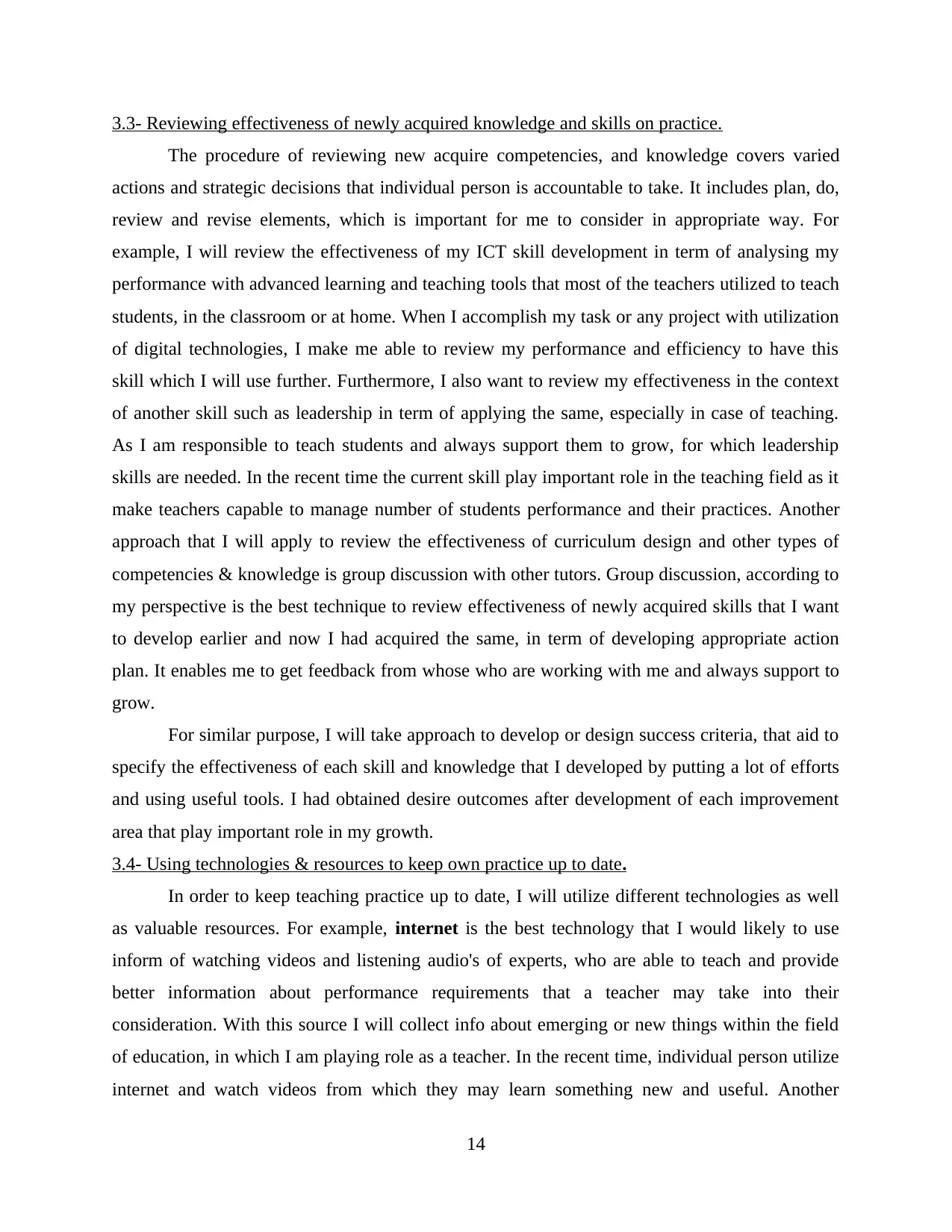
3.3- Reviewing effectiveness of newly acquired knowledge and skills on practice.
The procedure of reviewing new acquire competencies, and knowledge covers varied
actions and strategic decisions that individual person is accountable to take. It includes plan, do,
review and revise elements, which is important for me to consider in appropriate way. For
example, I will review the effectiveness of my ICT skill development in term of analysing my
performance with advanced learning and teaching tools that most of the teachers utilized to teach
students, in the classroom or at home. When I accomplish my task or any project with utilization
of digital technologies, I make me able to review my performance and efficiency to have this
skill which I will use further. Furthermore, I also want to review my effectiveness in the context
of another skill such as leadership in term of applying the same, especially in case of teaching.
As I am responsible to teach students and always support them to grow, for which leadership
skills are needed. In the recent time the current skill play important role in the teaching field as it
make teachers capable to manage number of students performance and their practices. Another
approach that I will apply to review the effectiveness of curriculum design and other types of
competencies & knowledge is group discussion with other tutors. Group discussion, according to
my perspective is the best technique to review effectiveness of newly acquired skills that I want
to develop earlier and now I had acquired the same, in term of developing appropriate action
plan. It enables me to get feedback from whose who are working with me and always support to
grow.
For similar purpose, I will take approach to develop or design success criteria, that aid to
specify the effectiveness of each skill and knowledge that I developed by putting a lot of efforts
and using useful tools. I had obtained desire outcomes after development of each improvement
area that play important role in my growth.
3.4- Using technologies & resources to keep own practice up to date.
In order to keep teaching practice up to date, I will utilize different technologies as well
as valuable resources. For example, internet is the best technology that I would likely to use
inform of watching videos and listening audio's of experts, who are able to teach and provide
better information about performance requirements that a teacher may take into their
consideration. With this source I will collect info about emerging or new things within the field
of education, in which I am playing role as a teacher. In the recent time, individual person utilize
internet and watch videos from which they may learn something new and useful. Another
14
The procedure of reviewing new acquire competencies, and knowledge covers varied
actions and strategic decisions that individual person is accountable to take. It includes plan, do,
review and revise elements, which is important for me to consider in appropriate way. For
example, I will review the effectiveness of my ICT skill development in term of analysing my
performance with advanced learning and teaching tools that most of the teachers utilized to teach
students, in the classroom or at home. When I accomplish my task or any project with utilization
of digital technologies, I make me able to review my performance and efficiency to have this
skill which I will use further. Furthermore, I also want to review my effectiveness in the context
of another skill such as leadership in term of applying the same, especially in case of teaching.
As I am responsible to teach students and always support them to grow, for which leadership
skills are needed. In the recent time the current skill play important role in the teaching field as it
make teachers capable to manage number of students performance and their practices. Another
approach that I will apply to review the effectiveness of curriculum design and other types of
competencies & knowledge is group discussion with other tutors. Group discussion, according to
my perspective is the best technique to review effectiveness of newly acquired skills that I want
to develop earlier and now I had acquired the same, in term of developing appropriate action
plan. It enables me to get feedback from whose who are working with me and always support to
grow.
For similar purpose, I will take approach to develop or design success criteria, that aid to
specify the effectiveness of each skill and knowledge that I developed by putting a lot of efforts
and using useful tools. I had obtained desire outcomes after development of each improvement
area that play important role in my growth.
3.4- Using technologies & resources to keep own practice up to date.
In order to keep teaching practice up to date, I will utilize different technologies as well
as valuable resources. For example, internet is the best technology that I would likely to use
inform of watching videos and listening audio's of experts, who are able to teach and provide
better information about performance requirements that a teacher may take into their
consideration. With this source I will collect info about emerging or new things within the field
of education, in which I am playing role as a teacher. In the recent time, individual person utilize
internet and watch videos from which they may learn something new and useful. Another
14
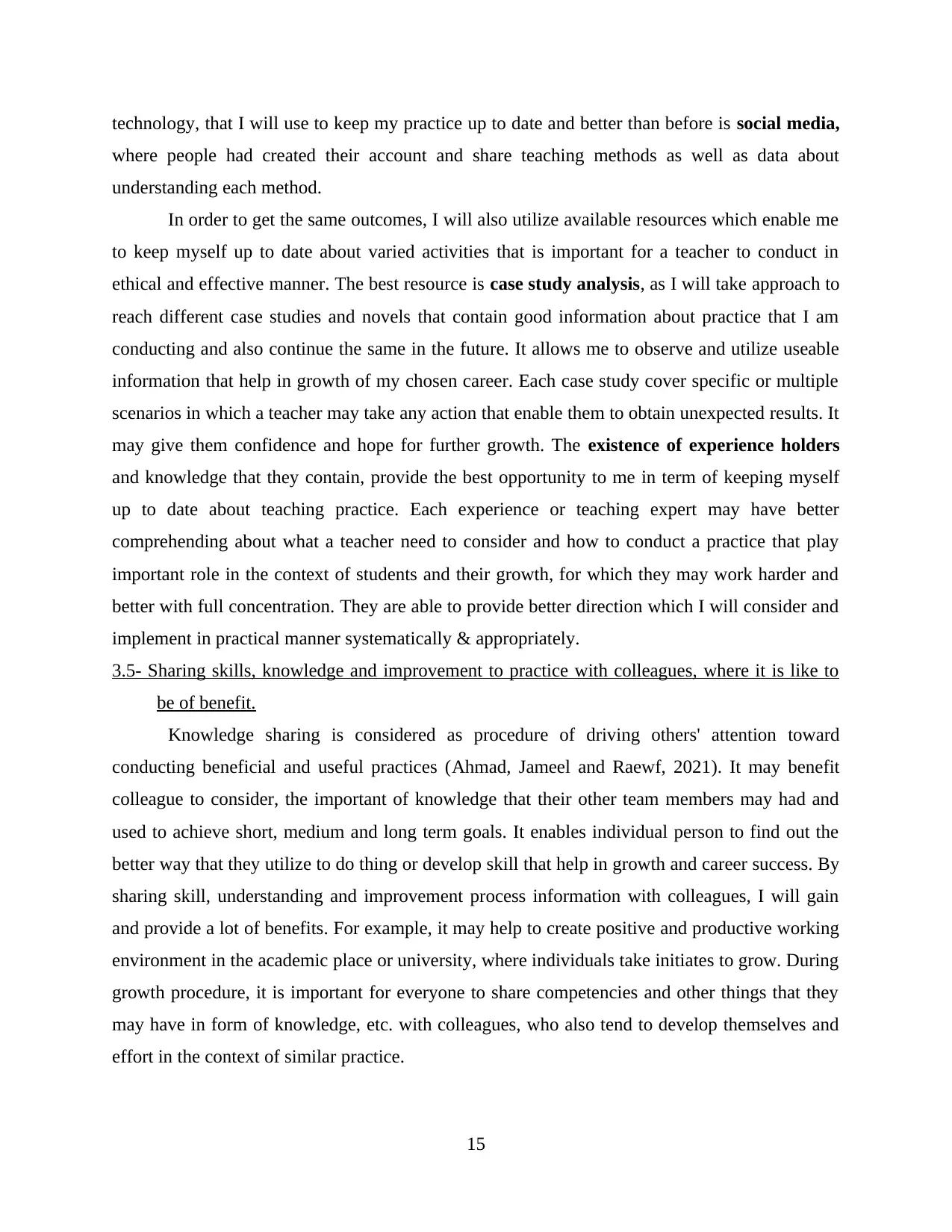
technology, that I will use to keep my practice up to date and better than before is social media,
where people had created their account and share teaching methods as well as data about
understanding each method.
In order to get the same outcomes, I will also utilize available resources which enable me
to keep myself up to date about varied activities that is important for a teacher to conduct in
ethical and effective manner. The best resource is case study analysis, as I will take approach to
reach different case studies and novels that contain good information about practice that I am
conducting and also continue the same in the future. It allows me to observe and utilize useable
information that help in growth of my chosen career. Each case study cover specific or multiple
scenarios in which a teacher may take any action that enable them to obtain unexpected results. It
may give them confidence and hope for further growth. The existence of experience holders
and knowledge that they contain, provide the best opportunity to me in term of keeping myself
up to date about teaching practice. Each experience or teaching expert may have better
comprehending about what a teacher need to consider and how to conduct a practice that play
important role in the context of students and their growth, for which they may work harder and
better with full concentration. They are able to provide better direction which I will consider and
implement in practical manner systematically & appropriately.
3.5- Sharing skills, knowledge and improvement to practice with colleagues, where it is like to
be of benefit.
Knowledge sharing is considered as procedure of driving others' attention toward
conducting beneficial and useful practices (Ahmad, Jameel and Raewf, 2021). It may benefit
colleague to consider, the important of knowledge that their other team members may had and
used to achieve short, medium and long term goals. It enables individual person to find out the
better way that they utilize to do thing or develop skill that help in growth and career success. By
sharing skill, understanding and improvement process information with colleagues, I will gain
and provide a lot of benefits. For example, it may help to create positive and productive working
environment in the academic place or university, where individuals take initiates to grow. During
growth procedure, it is important for everyone to share competencies and other things that they
may have in form of knowledge, etc. with colleagues, who also tend to develop themselves and
effort in the context of similar practice.
15
where people had created their account and share teaching methods as well as data about
understanding each method.
In order to get the same outcomes, I will also utilize available resources which enable me
to keep myself up to date about varied activities that is important for a teacher to conduct in
ethical and effective manner. The best resource is case study analysis, as I will take approach to
reach different case studies and novels that contain good information about practice that I am
conducting and also continue the same in the future. It allows me to observe and utilize useable
information that help in growth of my chosen career. Each case study cover specific or multiple
scenarios in which a teacher may take any action that enable them to obtain unexpected results. It
may give them confidence and hope for further growth. The existence of experience holders
and knowledge that they contain, provide the best opportunity to me in term of keeping myself
up to date about teaching practice. Each experience or teaching expert may have better
comprehending about what a teacher need to consider and how to conduct a practice that play
important role in the context of students and their growth, for which they may work harder and
better with full concentration. They are able to provide better direction which I will consider and
implement in practical manner systematically & appropriately.
3.5- Sharing skills, knowledge and improvement to practice with colleagues, where it is like to
be of benefit.
Knowledge sharing is considered as procedure of driving others' attention toward
conducting beneficial and useful practices (Ahmad, Jameel and Raewf, 2021). It may benefit
colleague to consider, the important of knowledge that their other team members may had and
used to achieve short, medium and long term goals. It enables individual person to find out the
better way that they utilize to do thing or develop skill that help in growth and career success. By
sharing skill, understanding and improvement process information with colleagues, I will gain
and provide a lot of benefits. For example, it may help to create positive and productive working
environment in the academic place or university, where individuals take initiates to grow. During
growth procedure, it is important for everyone to share competencies and other things that they
may have in form of knowledge, etc. with colleagues, who also tend to develop themselves and
effort in the context of similar practice.
15
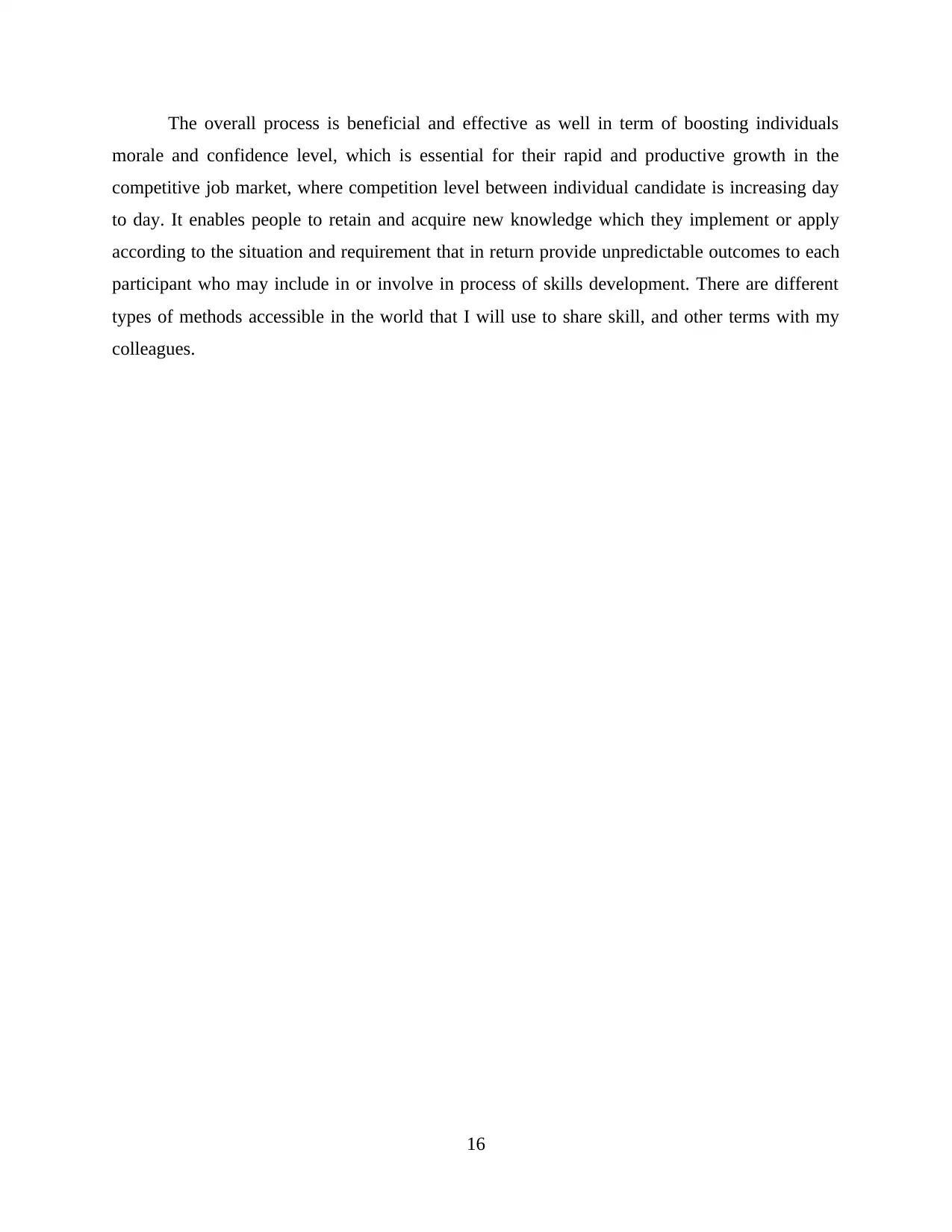
The overall process is beneficial and effective as well in term of boosting individuals
morale and confidence level, which is essential for their rapid and productive growth in the
competitive job market, where competition level between individual candidate is increasing day
to day. It enables people to retain and acquire new knowledge which they implement or apply
according to the situation and requirement that in return provide unpredictable outcomes to each
participant who may include in or involve in process of skills development. There are different
types of methods accessible in the world that I will use to share skill, and other terms with my
colleagues.
16
morale and confidence level, which is essential for their rapid and productive growth in the
competitive job market, where competition level between individual candidate is increasing day
to day. It enables people to retain and acquire new knowledge which they implement or apply
according to the situation and requirement that in return provide unpredictable outcomes to each
participant who may include in or involve in process of skills development. There are different
types of methods accessible in the world that I will use to share skill, and other terms with my
colleagues.
16
Secure Best Marks with AI Grader
Need help grading? Try our AI Grader for instant feedback on your assignments.
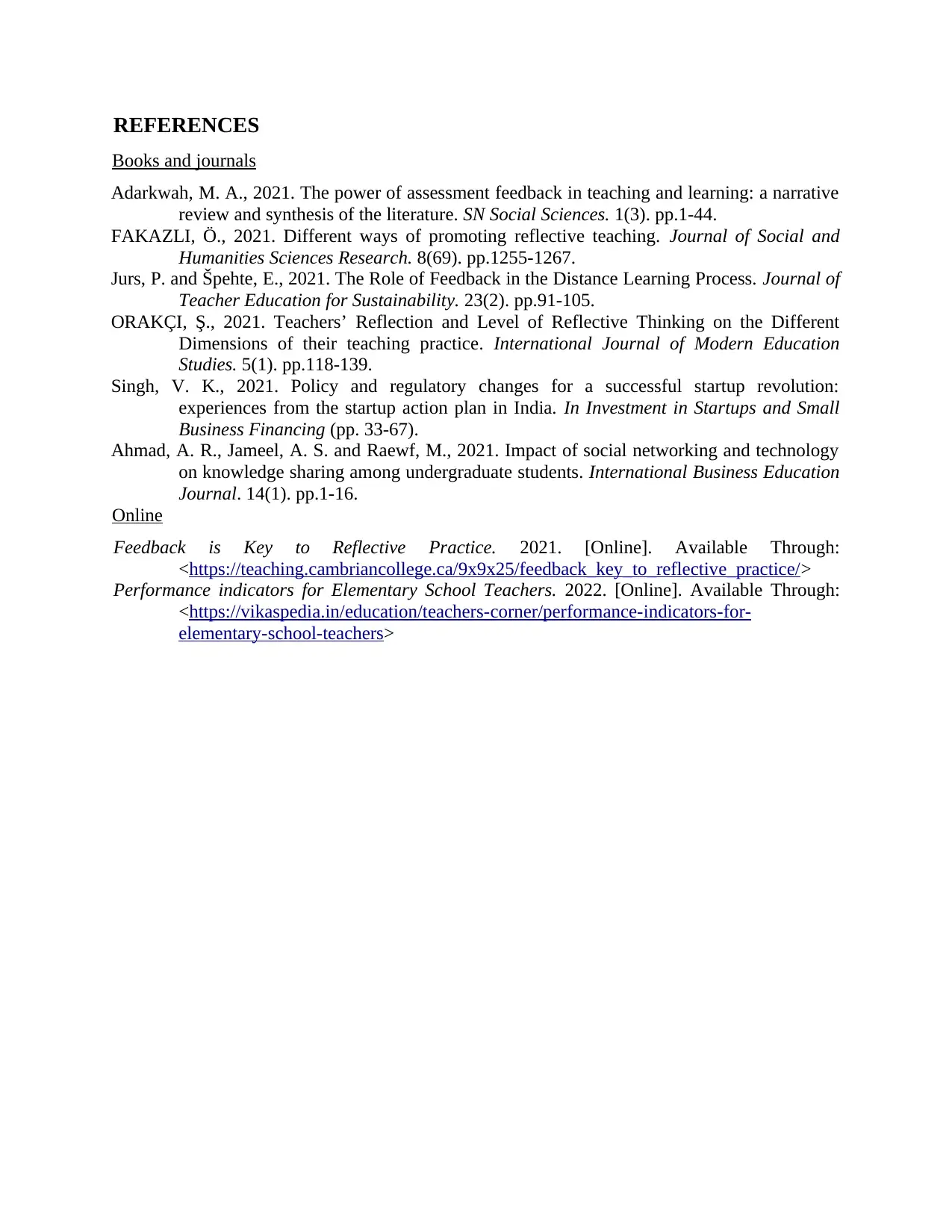
REFERENCES
Books and journals
Adarkwah, M. A., 2021. The power of assessment feedback in teaching and learning: a narrative
review and synthesis of the literature. SN Social Sciences. 1(3). pp.1-44.
FAKAZLI, Ö., 2021. Different ways of promoting reflective teaching. Journal of Social and
Humanities Sciences Research. 8(69). pp.1255-1267.
Jurs, P. and Špehte, E., 2021. The Role of Feedback in the Distance Learning Process. Journal of
Teacher Education for Sustainability. 23(2). pp.91-105.
ORAKÇI, Ş., 2021. Teachers’ Reflection and Level of Reflective Thinking on the Different
Dimensions of their teaching practice. International Journal of Modern Education
Studies. 5(1). pp.118-139.
Singh, V. K., 2021. Policy and regulatory changes for a successful startup revolution:
experiences from the startup action plan in India. In Investment in Startups and Small
Business Financing (pp. 33-67).
Ahmad, A. R., Jameel, A. S. and Raewf, M., 2021. Impact of social networking and technology
on knowledge sharing among undergraduate students. International Business Education
Journal. 14(1). pp.1-16.
Online
Feedback is Key to Reflective Practice. 2021. [Online]. Available Through:
<https://teaching.cambriancollege.ca/9x9x25/feedback_key_to_reflective_practice/>
Performance indicators for Elementary School Teachers. 2022. [Online]. Available Through:
<https://vikaspedia.in/education/teachers-corner/performance-indicators-for-
elementary-school-teachers>
Books and journals
Adarkwah, M. A., 2021. The power of assessment feedback in teaching and learning: a narrative
review and synthesis of the literature. SN Social Sciences. 1(3). pp.1-44.
FAKAZLI, Ö., 2021. Different ways of promoting reflective teaching. Journal of Social and
Humanities Sciences Research. 8(69). pp.1255-1267.
Jurs, P. and Špehte, E., 2021. The Role of Feedback in the Distance Learning Process. Journal of
Teacher Education for Sustainability. 23(2). pp.91-105.
ORAKÇI, Ş., 2021. Teachers’ Reflection and Level of Reflective Thinking on the Different
Dimensions of their teaching practice. International Journal of Modern Education
Studies. 5(1). pp.118-139.
Singh, V. K., 2021. Policy and regulatory changes for a successful startup revolution:
experiences from the startup action plan in India. In Investment in Startups and Small
Business Financing (pp. 33-67).
Ahmad, A. R., Jameel, A. S. and Raewf, M., 2021. Impact of social networking and technology
on knowledge sharing among undergraduate students. International Business Education
Journal. 14(1). pp.1-16.
Online
Feedback is Key to Reflective Practice. 2021. [Online]. Available Through:
<https://teaching.cambriancollege.ca/9x9x25/feedback_key_to_reflective_practice/>
Performance indicators for Elementary School Teachers. 2022. [Online]. Available Through:
<https://vikaspedia.in/education/teachers-corner/performance-indicators-for-
elementary-school-teachers>
1 out of 17
Related Documents
Your All-in-One AI-Powered Toolkit for Academic Success.
+13062052269
info@desklib.com
Available 24*7 on WhatsApp / Email
![[object Object]](/_next/static/media/star-bottom.7253800d.svg)
Unlock your academic potential
© 2024 | Zucol Services PVT LTD | All rights reserved.



